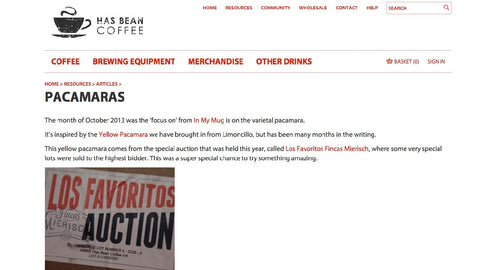Episodes
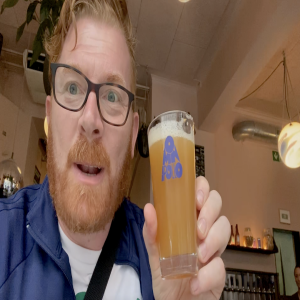
Saturday Jun 20, 2020
Episode 606: Brazil Carmo Estate Pulped Natural Bourbon
Saturday Jun 20, 2020
Saturday Jun 20, 2020
The Junqueira family started growing coffee on the highlands of southern Minas Gerais 150 years ago. The current owner is Tulio Junquiera. He's from the fifth generation of the family, and he's combined tradition with innovation to make Carmo Estate a sustainable farm dedicated to the production of specialty coffees. Tulio is also a former president of the Brazil Specialty Coffee Association (BSCA).
Carmo Estate’s mission is to produce exceptional coffees while providing its employees with a good quality of life and respecting the environment. The farm is located near the town of Heliodora in the southern state of Minas Gerais, which is a stunning region with mountainous terrain, mineral water springs, and ideal conditions to grow specialty coffees.
Carmo Estate has 220 hectares (545 acres) of land dedicated to the coffee varieties Mundo Novo, Catuaí, Catucaí, Bourbon, Acaiá and Icatú. The owners’ personal attention, the agronomists’ specialist supervision, and the fertile soil contribute to an average yield of 40 bags per hectare. That's more than twice the national average. Coffees from Carmo Estate are grown at altitudes ranging from 950 to 1,200 metres above sea level (3,100 to 3,900 feet).
The milling facilities at Carmo Estate were developed especially for the production of high-quality specialty Naturals and Pulped Naturals. The spacious drying patios are complemented by mechanical dryers, which are used when weather conditions are not favourable. The farm stores all of its coffee in wooden silos and has its own warehouse.
Carmo Estate is committed to the wellbeing of its employees and partners. Healthcare, on-site schooling for children, programmes to encourage workers to build their own housing, adult education projects, and the importance of environmental preservation are all hallmarks of the farm. Carmo Estate also runs an innovative profit-sharing programme, in which employees are invited to become partners in Carmo Estate and thus become entitled to a share of the profits earned from the sale of its coffee.
Each year this coffee brings us lovely, sweet caramel, and this year is no exception. Alongside that, you get a hit of digestive biscuit before it finishes on pecan nuts. There's just a nod to dark chocolate too, adding depth to it all.
- Country: Brazil
- Region: Minas Gerais
- City: Heliodora
- Farm: Carmo Estate
- Altitude: 950–1,200 m.a.s.l.
- Varietal: Bourbon
- Processing: Pulped Natural
- Producer: Túlio Henrique Rennó Junqueira
CUPPING NOTES
Caramel, digestive biscuit, pecan, dark chocolate
Clean cup: (1–8): 6
Sweetness: (1–8): 7
Acidity: (1–8): 6
Mouthfeel: (1–8): 6
Flavour: (1–8): 7
Aftertaste: (1–8): 6
Balance: (1–8): 6.5
Overall: (1–8): 6.5
Correction: (+36): +36
Total (max. 100): 87
Roast Information
Medium-dark - keep the pace up pushing it through first crack, then let it slow itself down in the gap to develop those fantastic caramels, and drop it just before second gets going.

Saturday Jun 13, 2020
Episode 605: Brazil Fazenda Inglaterra Natural Bourbon
Saturday Jun 13, 2020
Saturday Jun 13, 2020
Fazenda Inglaterra is a farm we've been buying from for over ten years, and it's one that I am very proud to be working with and linked with. The owner is my very good friend, Stephen Hurst.
To tell the story of Inglaterra, I'll hand this over to Stephen of the Hurst variety to tell you how he came to own 'Inglaterra':
“Maybe it had always been an idea in the back of my mind – so a couple of years ago when some friends in Brazil mentioned that a small coffee farm was for sale, I had a look.
The farm's name (Fazenda Toca Da Onca) means 'hiding place of a small wildcat'. The locals now call the farm 'Inglaterra'. The previous owners had abandoned Toca Da Onca/Inglaterra. So we had to start again, almost from scratch. Some surviving coffee trees were pruned right back and the coffee that you are now drinking is that re-growth from the original old trees.
The farm is located near the lovely spa town of Poços de Caldas in the coffee-growing heartlands of Brazil’s Minas Gerais state. The farm's elevation is 950–1300 metres, and it has rich soil. It's on the edge of an ancient caldera/super volcano, whose outline can be seen on satellite images. 50% of the farm is virgin Mata Atlantica forest and as long as I own it, it will stay that way. I am replanting some areas with the help of my local friends Gabriel and Cristiano, without whose assistance this project would never have started."
This is a naturally processed Bourbon lot. To find out more about what this means, please make sure to have a look at our natural processing video and also our article on the Bourbon varietal.
This screams dark chocolate to me – like a melted bar of Bournville. A walnut aftertaste creeps in as it cools, but this one is all about the dark chocolate.
- Country: Brazil
- Region: Minas Gerais
- City: Poços de Caldas
- Farm: Fazenda Inglaterra
- Owner: Stephen Hurst
- Farm size: 10 hectares
- Coffee growing area: 5 hectares
- Altitude: 1,200 m.a.s.l.
- Varietal: Bourbon
- Processing system: Natural
CUPPING NOTES
Dark chocolate, walnut
Clean cup: (1–8): 6
Sweetness: (1–8): 6
Acidity: (1–8): 6
Mouthfeel: (1–8): 6
Flavour: (1–8): 6.5
Aftertaste: (1–8): 6.5
Balance: (1–8): 6.5
Overall: (1–8): 6.5
Correction:(+36): +36
Total (max. 100): 86
Roast Information
Medium-dark – push it through first and through the gap at a steady pace, looking to drop it just before second gets going.
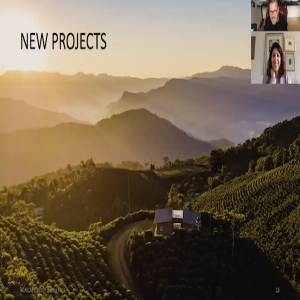
Saturday Jun 06, 2020
Episode 604: Bolivia La Linda Washed Caturra
Saturday Jun 06, 2020
Saturday Jun 06, 2020
Coffee production in Bolivia was traditionally concentrated in the region of Los Yungas, where lush sub-tropical vegetation and environmental conditions helped to produce the amazing-quality Bolivian coffee that we all know and love.
Caranavi is located north of the department of La Paz city. It's 150 kilometres from the capital, and it is the centre of Bolivian coffee production. Its fertile soils and altitude give Bolivia the potential to produce brilliant and unique coffees.
Due to the many complications and challenges within the Bolivian coffee industry, many of the smaller farms we have worked with in the past are no longer producing coffee. Whilst this has created some challenges for us, it has had a much more significant impact on our exporting partners AgriCafe, who have been working with these growers for many years. As a result, they have decided to begin farming themselves, in an effort to demonstrate what can be achieved with the application of more modern techniques and a scientific farming approach.
Agricafe manages seven farms, of which La Linda was the first to bear fruit a few years ago. La Linda is known as The Seed Garden for the other farms in the Buena Vista project. Alongside this Caturra lot, the farm is producing Longberry, Catuai and Typica lots; it's also producing Java, SL28 and Bourbon, which are all relatively new plantings in Bolivia.
It's a Cadbury's Whole Nut, with some macadamia nuts mixed in. This is a great example of just how good a simple coffee can be - the smooth texture, chocolate sweetness and nutty finish is just an incredibly chuggable brewed coffee and a fantastic classic style espresso.
- Country: Bolivia
- Region: Yungas
- Province: Caranavi
- Colony: Bolinda
- Farm: La Linda
- Altitude: 1,400 - 1,450 m.a.s.l.
- Processing Method: Washed
- Varietal: Caturra
CUPPING NOTES
Cadbury's Whole Nut, macadamia nut
Clean Cup: (1-8): 6
Sweetness: (1-8): 7
Acidity: (1-8): 6
Mouthfeel: (1-8): 6.5
Flavour: (1-8): 7
Aftertaste: (1-8): 6
Balance: (1-8): 7
Overall: (1-8): 6.5
Correction: (+36): +36
Total: (max 100): 88
Roasting Information
Medium-dark - keep it steady and aim for the first pops of second on the drop.
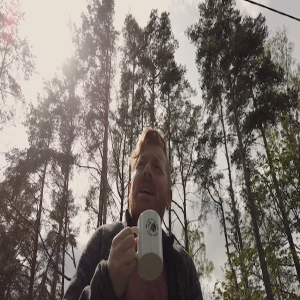
Saturday May 30, 2020
Episode 603: Nicaragua El Encanto Washed Caturra
Saturday May 30, 2020
Saturday May 30, 2020
Another one from our very good friends indeed, the Mierisch family!
Encanto was actually one of the very first farms the family owned, although originally not for coffee, but cattle. It's still largely a cattle farm to this day, and alongside those cattle come horses too! On my last visit to Nicaragua earlier this year, instead of walking around the farm, we rode on horses like real cowboys (except for me, I had a mule as I’m no cowboy!).
The farm is large, and the land is diversified, which means it produces amazing coffee. Like all the family's farms, everything at El Encanto is really centered around the people who work there, providing great resources such as pre-school facilities, housing, a small shop, water and electricity, and healthcare.
Because of its previous life exclusively as a cattle farm, there's plenty of shade on the farm, which is super beneficial for the coffee plants' growth. By shading the coffee from direct sunlight as it grows, the plants are able to develop at a slower rate. This allows the natural sugars in the coffee cherry to mature and gives the coffee itself a sweeter flavour which you can definitely taste in the cup in this coffee!
There's a rush of dark chocolate at the beginning but it's underpinned by a sweetness of digestive biscuit. On the finish is a little delicate red grape and then in the aftertaste comes walnuts.
- Country: Nicaragua
- Municipality: Matagalpa
- Region: San Ramon
- Farm name: El Encanto
- Producers: The Mierisch Family
- Altitude: 900 masl
- Varietal: Caturra
- Processing method: Washed
CUPPING NOTES
Dark chocolate, digestive biscuit, red grape, walnut
Clean cup: (1–8): 6
Sweetness: (1–8): 6.5
Acidity: (1–8): 6
Mouthfeel: (1–8): 6
Flavour: (1–8): 6.5
Aftertaste: (1–8): 6
Balance: (1–8): 6.5
Overall: (1–8): 6.5
Correction: (+36): +36
Total: (max. 100): 86
Roast Information
Medium-dark - through first and give it some time to develop, dropping it just with the very first pops of second in the cooling tray.
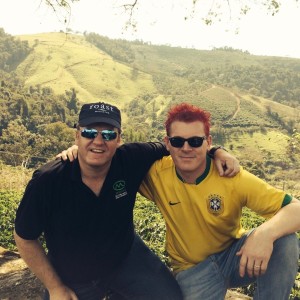
Saturday May 23, 2020
Episode 602: Brazil Fazenda Inglaterra Natural Bourbon CoE Entrant
Saturday May 23, 2020
Saturday May 23, 2020
Fazenda Inglaterra is a farm we've been buying from for over a decade, and it's one that I am very proud to be working with and linked with. The owner is my very good friend, Stephen Hurst.
Each year, Stephen (can I just call him Hursty from now on?!) picks a lot from his farm to enter into the Cup of Excellence competition. Unusually, there are separate competitions for Pulped Natural and Natural processed coffees in Brazil. Hursty competed with a Natural this year.
Unfortunately for him, this lot was a hair’s breadth short of making it through. That works out well for us because it’s a really delicious coffee that we can now enjoy!
To tell the story of Inglaterra, I'll hand this over to Hursty to tell you how he came to own 'Inglaterra':
“Maybe it had always been an idea in the back of my mind – so a couple of years ago when some friends in Brazil mentioned that a small coffee farm was for sale, I had a look.
The farm's name (Fazenda Toca Da Onca) means 'hiding place of a small wildcat'. The locals now call the farm 'Inglaterra'. The previous owners had abandoned Toca Da Onca/Inglaterra. So we had to start again, almost from scratch. Some surviving coffee trees were pruned right back and the coffee that you are now drinking is that re-growth from the original old trees.
For the coffee people, the varietals are Icatu, Acaia and Catucai. In future I expect coffee cherry varietals to become as well known as wine grape varietals, and to a much wider audience. The farm is located near the lovely spa town of Poços De Caldas in the coffee-growing heartlands of Brazil’s Minas Gerais state. The farm's elevation is 950–1300 metres, and it has rich soil. It's on the edge of an ancient caldera/super volcano, whose outline can be seen on satellite images. 50% of the farm is virgin Mata Atlantica forest and as long as I own it, it will stay that way. I am replanting some areas with the help of my local friends Gabriel and Cristiano, without whose assistance this project would never have started."
- Country: Brazil
- Region: Minas Gerais
- City: Poços de Caldas
- Farm: Fazenda Inglaterra
- Owner: Stephen Hurst
- Farm size: 10 hectares
- Coffee growing area: 5 hectares
- Altitude: 1,200 m.a.s.l.
- Varietal: Bourbon
- Processing method: Natural
CUPPING NOTES
Milk chocolate, caramel, almond, hazelnut, sultana
Clean cup: (1–8): 6
Sweetness: (1–8): 7
Acidity: (1–8): 6.5
Mouthfeel: (1–8): 7
Flavour: (1–8): 6.5
Aftertaste: (1–8): 6.5
Balance: (1–8): 6.5
Overall: (1–8): 6
Correction: (+36): +36
Total: (max. 100): 88
Roast Information
Medium-dark - through first crack and keep it going steadily towards second, but finishing the roast with no more than the very first pops of second in the cooling tray.
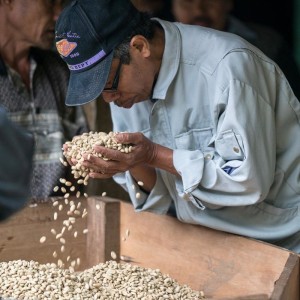
Saturday May 16, 2020
Episode 601: Sulawesi Tana Toraja Kalosi A Washed
Saturday May 16, 2020
Saturday May 16, 2020
Sulawesi was formerly known as Celebes. Along with the rest of Indonesia, it was under Dutch control from the early 1600s until World War II. Coffee production in Indonesia was introduced and dictated by the Dutch East India Company. The first Typica plants arrived in 1750, as they had begun to be spread around the other islands of Java and Sumatra.
The most famous coffees from Indonesia are those from the island of Sumatra, and they're processed as wet hulled coffees. This lends them their characteristic earthy, savoury, and sometimes almost meaty flavours.
Sulawesi, on the other hand, primarily produces washed coffees for export, and our partners there at TOARCO (a Japanese-Indonesian joint mill and export venture) are experts at producing clean, sweet, and fruity coffees that we really enjoy.
TOARCO owns the Pedamaran Plantation at 900–1,250 metres above sea level. It also purchases wet parchment (at 40% moisture) coffees from small producers at collection points in Perangian, Pango Pango, Minanga, and Perindingan. Once collected, the coffee is trucked to Pedamaran Plantation immediately after purchase. When it gets there it's dried using mechanical Yamamoto vertical dryers and Pinalhalense guardiolas, or horizontal dryers like those often found throughout Colombia. The mechanical dryers assist in maintaining uniform drying, and this helps the processing go more efficiently and cleanly. The drying typically takes 72 hours.
If a producer wants to sell their parchment coffee to TOARCO, they need to get certified to the quality standards in selective picking, storage, transportation, moisture levels, and so on. Farmers are issued ID cards that allow them to sell their coffee at various purchasing points in the Tana Toraja region during the market week.
TOARCO is focused on providing education and support to its producer partners. Currently, the company offers once-yearly classes for producers to receive their ID cards, but they hope to expand their educational opportunities to twice yearly and include things such as cherry selection, planting and picking techniques, and fermentation. They also hold a party at the end of the harvest cycle to celebrate, giving out awards to producers. The rewards include things such as depulpers and other necessary tools. Between 150 and 200 producers attend the party every year.
Most of the coffee produced in Toraja is of the S795 varietal (the S stands for 'section'). It is thought to be the cross of S288 (a natural hybrid of Liberica and Arabica) and an old Kent varietal (a Typica variety that has been adapted to growing conditions in India). S795 is the most commonly-planted Arabica coffee in India and southeast Asia, and it was one of the first coffee leaf rust-resistant varieties to be discovered. It is also commonly known as 'Jember' thanks to the Jember Indonesian Coffee and Cacao Research Institute (ICCRI), whose staff first introduced it to the coffee farmers of Indonesia.
This coffee is big and bold. There are bags of dark treacle with a delicate zing of dried cranberries and goji berries, and then it finishes with dark chocolate.
- Country: Indonesia
- Island: Sulawesi
- Region: Toraja
- Altitude: 1,400–1,600 m.a.s.l.
- Producers: Various smallholder farmers of Perangian, Pango Pango, Minanga, and Perindingan
- Processing method: Washed
- Drying method: Yamamoto vertical dryers, and Pinhalense guardiola
- Drying time: 72 hours
- Varietal: S795
- Grade: A
CUPPING NOTES
Treacle, dried cranberries, goji berries, dark chocolate
Clean cup: (1–8): 6
Sweetness: (1–8): 6.5
Acidity: (1–8): 6.5
Mouthfeel: (1–8): 6.5
Flavour: (1–8): 6.5
Aftertaste: (1–8): 6
Balance: (1–8): 6.5
Overall: (1–8): 6
Correction: (+36): +36
Total: (max. 100): 86.5
Roast Information
Medium-dark to dark – we prefer this pushed steadily to the edge of second to let all the flavours shine, but it'll take a slightly slower and darker roast if you want to reduce the acidity and focus on the heavy body.
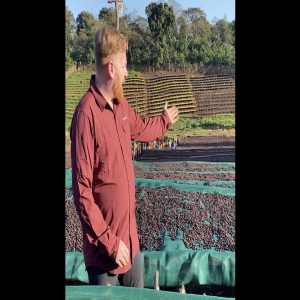
Saturday May 09, 2020
Episode 600: Ethiopia Sharo Natural
Saturday May 09, 2020
Saturday May 09, 2020
DETAILS
The Sharo washing station belongs to Israel Degfa, who also brings us the wonderful Ana Sora coffee each year. Sharo is located near to the town of Bule Hora, which is in the Sidamo region and a bit south of Yirgacheffe town.
Sharo is a washing station that collects coffee cherries from local smallholders and processes them. As you'll have seen if you've had the Ana Sora coffee for the last few years, Israel is very focused on continually improving.
He's constantly improving the setup at the washing stations, and he keeps pushing to improve consistency and attention to detail in all the coffee production. That's especially difficult when you're buying the coffee cherries from many local farming families, but lots of work has gone into supporting local growers and helping them do a better job – and helping them earn more by doing so.
This coffee really jumped out at us as we tasted some of Israel's coffees. Very different to our beloved Ana Sora, this was heavier in body and darker in flavours, but it's a really interesting and different coffee that showed another side of what Natural processing can bring. The big shock came when we looked at the information and discovered it was a Grade 2!
What does that mean? Good question!
All coffee sold in Ethiopia gets graded by the Ethiopian Coffee Exchange (ECX). The visual quality of the green beans – any defects or damage – is assessed, and the coffee is cupped to see how it tastes. Between these factors, a coffee is given a grade from 1 (the best) to 5 (the worst), with grades 1 and 2 being considered Speciality coffee. So in theory, this coffee isn't quite as good as the Ana Sora (Grade 1), nor in fact as good as most of the other coffees we see from Ethiopia.
Of course, we wouldn't have bought this coffee if we agreed with that. Whilst we don't rate it quite as highly as our lots from Ana Sora, it's still a great coffee and far better than many Grade 1 lots we've looked at in the past.
There's loads of rich dark chocolate here, but it's got a boozy hit of cherry brandy in there too. It's all got a thick, gloopy texture, but juicy cherry takes centre stage on the aftertaste and draws you back in for another sip of the chocolate.
- Country: Ethiopia
- Region: Sidamo
- Nearest town: Bule Hora
- Owner: Israel Degfa
- Washing station: Sharo
- Varietals: Indigenous wild
- Processing: Natural
CUPPING NOTES
Dark chocolate, cherry, brandy
Clean cup: (1–8): 6
Sweetness: (1–8): 7
Acidity: (1–8): 6.5
Mouthfeel: (1–8): 7
Flavour: (1–8): 6.5
Aftertaste: (1–8): 6
Balance: (1–8): 6
Overall: (1–8): 6
Correction:(+36): +36
Total (max. 100): 87
Roast Information
Medium – push this into the gap with a nice and steady pace, and then finish the roast before second gets going.

Saturday May 02, 2020
Episode 599: Nicaragua Finca Limoncillo Washed Caturra
Saturday May 02, 2020
Saturday May 02, 2020
I've been telling the story of Hasbean and Finca Limoncillo for many, many years now. I don't intend to stop any time soon because it's such a big, big, big relationship for me. 😊
So much of where we are today has come from this relationship. I'm really proud of everything that's happened in the past, and super excited for where we can go in the future.
Our relationship with Finca Limoncillo began in 2007, and back then we were buying their delicious coffee as part of a buying group. I loved it from the very first time I cupped it, and it was a coffee I just had to get. It was only after the auction closed that I discovered it was owned by a family in Nicaragua who were already good friends of mine, and indeed probably the only people I knew from the whole country!
The following year I visited the farm with our importers, and I spent the whole trip begging them to bring the coffee into the UK for us. Eventually, thanks to my supreme Steve pester power, they caved in (probably just to stop the flow of emails and phone calls!) and kindly did so.
This setup worked well for a time, but we received notice a couple of years ago that the importers were not going to be buying the coffee again (and for reasons other than the cup quality). This led to some frantic phone calls and a thorough search down the back of the sofa for loose change to fund buying twelve months’ worth of coffee all at once. There were many, many obstacles in the way of doing this deal, but we were lucky in that we were able to pull everything together in a very short amount of time.
The upside of all of this is that we now work directly with Finca Limoncillo instead of going via anyone else, and this is a relationship I’m super happy to have. This coffee has gone from a one-off Cup of Excellence buy to a fantastic long-term relationship that I'm so very proud to have.
Finca Limoncillo is located in Matagalpa and, at 171 hectares in size, it. is. huge! Situated at an amazing location, it boasts nine waterfalls within the farm and is owned by the Mierisch family; as I have already said, they’re good friends, and also well-respected producers in Nicaragua. They’re known for their experimental processing, varietal work, and exceptional coffee.
The fact that the family are friends helps us drill down into the details of what they do for the people who work for them. The information continues to prove to me that good people grow good coffee.
Every year this manages to deliver the same cup, which always reminds me of a toffee apple. This year is no exception: it has sweet toffee on the front and a balanced acidity of green apple following up. There's a little milk chocolate mixed in there too this year, but it keeps that fantastic balance that makes this so moreish.
- Country: Nicaragua
- Municipality: Yasica Norte
- Region: Matagalpa
- Farm name: Limoncillo
- Producers: the Mierisch family
- Farm size: 171 manzanas (hectares)
- Coffee growing area: 109 hectares
- Altitude: 1,200 m.a.s.l.
- Varietal: Caturra
- Processing method: Washed
CUPPING NOTES
Toffee, green apple, milk chocolate
Clean cup: (1–8): 6
Sweetness: (1–8): 7
Acidity: (1–8): 6.5
Mouthfeel: (1–8): 6
Flavour: (1–8): 6.5
Aftertaste: (1–8): 6
Balance: (1–8): 7
Overall: (1–8): 6
Correction: (+36): +36
Total: (max. 100): 87
Roast Information
Medium-dark – through first crack, slow it down a little in the gap and drop it just with the first pops of second; no more.
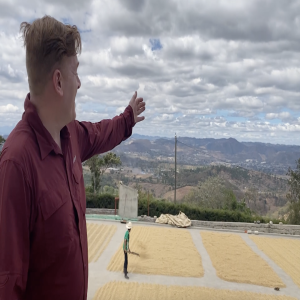
Saturday Apr 25, 2020
Episode 598: Guatemala El Limon Natural Caturra
Saturday Apr 25, 2020
Saturday Apr 25, 2020
I first discovered El Limon on my trip to Guatemala in early 2013. At the time we'd never bought coffee directly from Guatemala, but since then this has become one of our strongest and most amazing Hasrelationships.
My friend Raul (whom you may remember as the World Barista Champion of 2012!) in Guatemala had been buying coffee from these guys for a couple of years, and he was very keen for me to go and meet them. Located around an hour's drive to the east of Guatemala City in the small town of Palencia, this farm sits at an altitude between 1,600 and 1,800 metres above sea level. It's owned by Guadalupe Alberto Reyes, who's also just known as Beto. He used to be the Mayor of Palencia, and he helped to build and develop the town.
Palencia is not part of the eight regions of coffee as defined by Anacafé, but you can see a lot of development in the zone, and this farm is a perfect example of that development. I like being in places that are working to be hot and up-and-coming, as well as those that are established players.
One of the main reasons I love El Limon is Beto's desire to experiment; the farm mostly produces Bourbon and Caturra, but he also plays around with a few other varietals. The experimentation is thanks to Beto's motivation; he has really focused on the farm over the last few years. He wanted to take more care in every step they take – from picking to processing, to shipping – and also take more care in the agronomy of the farm.
This is very much a family affair: his wife and son also work on the farm, along with Beto's siblings. In fact, his son is studying agronomy at the local college for the benefit of the farm.
The dedication and care devoted to each step of production is reflected in the fact that the family has built a new wet mill, so that they can separate different lots and have control over the quality of the coffee. Previously the mill could process only one lot; now the farmers are able to process many lots, and keep separate days' pickings and varietals in their own parcels.
With this wet mill came another opportunity, which was for neighbours and people within the region of Palencia to bring their coffees to the mill where they could get them processed. It's another sign that this is a hot spot for Guatemalan coffee.
As time moves on, Beto doesn't want to stand still and is continuing to invest in the farm. He showed me lots of new planting during my recent visit, and a lot of building work around the wet mill. He is also building a QC lab and new accommodation for people working on the farm. It was a real hive of activity.
Beto and his family have always been the perfect hosts whenever I visited the farm. They are such welcoming people and take great pride in showing me around their farm. One of the kindest things they've done for me is to welcome me into their home when I am visiting, and they always prepare the most amazing meals! When you travel as much as I do, mid-trip you find yourself longing for something big, home-cooked, and not from a restaurant or roadside pop-up cafe. Traditional Guatemalan meals are just the ticket, and I always look forward to the food – but mainly I look forward to the company.
Here’s a slice of apple pie for you! Alongside stewed apples and sweet pastry is a hint of lemon zest. Then a dollop of brandy butter kicks in, with a creamy texture and that hit of booze.
- Country: Guatemala
- Region: Palencia
- Farm: El Limon
- Producer: Guadalupe Alberto 'Beto' Reyes
- Altitude: 1,600 m.a.s.l.
- Varietal: Caturra
- Processing method: Natural
CUPPING NOTES
Apple pie, brandy butter, lemon zest
Clean cup: (1–8): 6
Sweetness: (1–8): 7
Acidity: (1–8): 6.5
Mouthfeel: (1–8): 6.5
Flavour: (1–8): 7
Aftertaste: (1–8): 6
Balance: (1–8): 6.5
Overall: (1–8): 6
Correction: (+36): +36
Total: (max. 100): 87.5
Roasting Information
Medium-dark - like other naturals, this will go quickly once you're in crack. Very similar to other lots from the farm, this needs a bit of development and a bit of heat so look for those first pops of second on the drop.
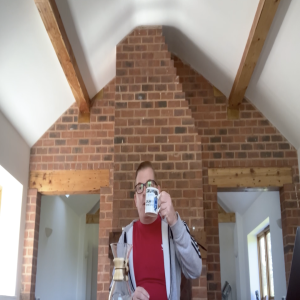
Saturday Apr 18, 2020
Episode 597: Bolivia Vincent Paye
Saturday Apr 18, 2020
Saturday Apr 18, 2020
A few years back we had a lot that was produced by various smallholder farmers from the small town of Copacabana, which lies about 180 kilometres from La Paz in the heart of the Caranavi coffee-producing region. Then in 2016 things changed a little, and the lot came from just one producer in the area. His name is Vincent Paye. That year I described him as a beacon of hope in a tough growing region, and that beacon has continued to shine brightly.
Caranavi is a lush and fertile region. It has steep slopes and valleys that provide excellent conditions for growing high quality coffee, and they also support a diverse range of native flora and fauna. The area has rich volcanic soils and regular rainfall. Coffee growing heaven!
The colony of Copacabana has a collection of small farms that are each around five hectares in size (although Vincent has ten hectares). The farms range over an altitude of 1,300 to 1,700 metres above sea level (m.a.s.l.), and they benefit from an average annual temperature between 15 and 26°C. This lot comes from Vincent's farm, which is very similar to neighbouring farms and is at an altitude of around 1,550 m.a.s.l. These traditional farms use no chemicals or pesticides and are certified organic, although we do not currently hold an organic certification ourselves.
The main harvest runs from May to September, peaking around July and August. The cherries are handpicked when they're fully ripe, and they're then delivered to the central mill, called Buena Vista, where they are fully washed.
Bolivia is a challenge and is going through some tough times: dwindling crops, ageing plants, lack of varietal diversity, and ageing producers with children who have little to no interest in carrying on the family business. But then there are people like Vincent who are doing wonderful work to buck that trend. He's been planting new stock, working hard with his family, and increasing his yield – and also increasing the quality of his coffee.
Imagine a fresh segment of orange, with chocolate drizzled all over it. Behind that, there's a sweetness which reminds me of dark honey, then on the aftertaste a delicate dried apricot.
- Country: Bolivia
- Region: Yungas
- Municipality: Caranavi
- Town: Copacabana
- Farm: Vincent Paye
- Altitude: 1,550 m.a.s.l.
- Producer: Vincent Paye
- Varietal: Red and Yellow Caturra
- Processing: Washed
CUPPING NOTES
Orange, chocolate, dark honey, dried apricot
Clean cup: (1–8): 6
Sweetness: (1–8): 7
Acidity: (1–8): 6.5
Mouthfeel: (1–8): 6
Flavour: (1–8): 7
Aftertaste: (1–8): 6.5
Balance: (1–8): 6
Overall: (1–8): 6.5
Correction: (+36): +36
Total: (max. 100): 87.5
Roast Information
Medium to medium-dark - Through first at a nice steady pace, then push it towards second but drop with no more than the very first pops as it cools.
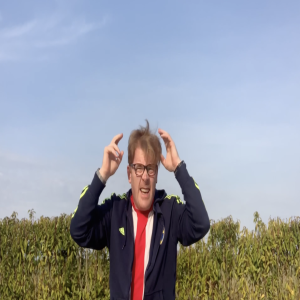
Saturday Apr 11, 2020
Episode 596: Ecuador Perla Chiquita AAA Washed Bourbon
Saturday Apr 11, 2020
Saturday Apr 11, 2020
In 1998 Fabián Lomas worked in Quito for a company that bought and sold coffee. During his time working for this company he was able to learn a lot about coffee, and about coffee production and processing methods. Fast forward ten years to 2008: Fabián decided to take a big risk and rent a piece of land to produce his own coffee. He had the eventual goal of making enough money to buy his own land.
From the very beginning Fabián was familiar with speciality coffee, and he wanted to start his farm off on the right foot. He took lots of care in the processes carried out on the farm to produce great tasting coffee. Fabián is currently trying to involve his two children, Willy and Lizeth, in the farm's operating procedures. Every time someone visits, Fabián encourages his children to show the guests around; he wants them to take over running the business one day.
Willy graduated from high school in 2016. Since then he has been working with his father, learning more about coffee production, and taking care of the agricultural management of the coffee trees. For instance, Willy and Fabián are in charge of weed management, fertilization, and harvesting. Lizeth not only takes care of the drying and hand-sorting of the coffee, but she also owns a garden centre.
Fabián's family have passed through hard economic moments in their lives, which has led to lack of fertilization. That in turn resulted in diseases affecting the harvest. However, now with the help of our exporting partners Caravela, they have been able to improve their economic situation and build a drying station, and their next plan is to finally buy the land to have their own farm.
What jumps out first is brown sugar - think dark, heavy demerara. Alongside that is a creamy body with a grating of lime zest and a delicate mango too.
- Country: Ecuador
- Parroquia: Pichincha
- Cantón: Nanagal
- Farm: Perla Chiquita
- Producer: Luis Fabián Lomas
- Altitude: 1,300 m.a.s.l.
- Total farm size: 5 hectares
- Coffee producing area: 1.5 hectares
- Varietal: Bourbon
- Processing method: Fully washed and fermented without water
- Fermentation time: 14 hours
- Drying method: Covered patios
- Drying time: 7–15 days
CUPPING NOTES
Demerara sugar, mango, lime zest
Clean Cup: (1-8): 6
Sweetness: (1-8): 7
Acidity: (1-8): 6.5
Mouthfeel: (1-8): 7
Flavour: (1-8): 6.5
Aftertaste: (1-8): 6
Balance: (1-8): 6.5
Overall: (1-8): 6.5
Correction:(+36): +36
Total (max 100): 88
Roasting Information
Medium to medium-dark - through first and give it some development. Pushing it up to the first pops of second and the brown sugar will shine, or keep it in the gap to highlight the fruit notes.

Saturday Apr 04, 2020
Episode 595: Brazil Fazenda Inglaterra Natural Canario
Saturday Apr 04, 2020
Saturday Apr 04, 2020
We've been buying from Fazenda Inglaterra for over ten years, and it's a farm that I am very proud to be working with and linked with, as well as the owner (and my very good friend) Stephen Hurst.
To tell the story of Inglaterra, I'll hand this over to Stephen of the Hurst variety to tell you how he came to own 'Inglaterra':
“Maybe it had always been an idea in the back of my mind – so a couple of years ago when some friends in Brazil mentioned that a small coffee farm was for sale, I had a look.
The farm's name (Fazenda Toca Da Onca) means 'hiding place of a small wildcat'. The locals now call the farm 'Inglaterra'. The previous owners had abandoned Toca Da Onca/Inglaterra. So we had to start again, almost from scratch. Some surviving coffee trees were pruned right back and the coffee that you are now drinking is that re-growth from the original old trees.
For the coffee people, the varietals are Icatu, Acaia and Catucai. In future I expect coffee cherry varietals to become as well known as wine grape varietals, and to a much wider audience. The farm is located near the lovely spa town of Poços De Caldas in the coffee-growing heartlands of Brazil’s Minas Gerais state. The farm's elevation is 950–1300 metres, and it has rich soil. It's on the edge of an ancient caldera/super volcano, whose outline can be seen on satellite images. 50% of the farm is virgin Mata Atlantica forest and as long as I own it, it will stay that way. I am replanting some areas with the help of my local friends Gabriel and Cristiano, without whose assistance this project would never have started."
Back to Stephen of the Leighton variety!
After Stephen bought the farm there was one varietal he decided to add to the plant stock that wasn't already there, and that varietal was Canario. It's one of those varietals you would never plant if you had to survive on coffee for your living – pests love it, its yield is really low and the slightest change in temperature will result in frost burn; a point proved a few years back when a cold snap experienced in Poços de Caldas left over 25% of this crop damaged.
So why grow it then? Well, it produces some of the most delicious coffee you can imagine. Also, it's something that Stephen had always wanted to ask producers to try but was too afraid to ask, so he just went ahead and did it himself!
Jump right into this when it's very hot and it's all dark chocolate, but as it begins to cool a little you'll get that shifting towards milk chocolate. It's joined by a hit of pecan nuts too and just a maple sweetness too. There's a hint of fruit too - think dried apricot pieces - for a very well balanced and more-ish coffee.
- Country: Brazil
- Region: Minas Gerais
- City: Poços de Caldas
- Farm: Fazenda Inglaterra
- Owner: Stephen Hurst
- Farm size: 10 hectares
- Coffee growing area: 5 hectares
- Altitude: 1,200 m.a.s.l.
- Varietal: Canario
- Processing system: Natural
CUPPING NOTES
Milk chocolate, dark chocolate, pecan, maple, dried apricot.
Roast Information
Medium Dark - through first and give it a little time in the gap to develop, dropping it and looking for the very first pops of second as it cools.
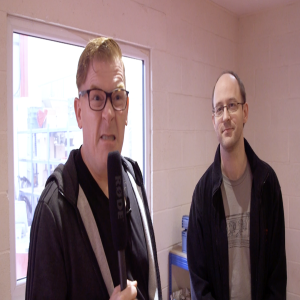
Saturday Mar 28, 2020
Episode 594: Bolivia Bebeto Mamani Washed
Saturday Mar 28, 2020
Saturday Mar 28, 2020
The name of this coffee producer may sound a little familiar: Bebeto ('Beto' for short) is the son of the legend that is Teodocio Mamani. Teodocio owns Finca Canton Uyunense, which is a farm we have worked with since 2012.
His farm is located in 18 de Mayo, which is a municipality of Caranavi (and part of canton Uyunense). Lots of farms can be called a variation on these names because the land traditionally tends not to have a name.
This year is the fifth year that Bebeto has grown coffee under his own guardianship, and it's the fourth year that he has processed it himself too. Just like previous years, and as you'd expect from a Mamani, the results are delicious.
Bebeto used a depulper to remove the cherry, then left the coffee to go through a dry fermentation process for 16–18 hours, and then ran it through the scrubber section of the pulper to remove the final remains of the mucilage. Bebeto then transferred the coffee to raised African beds, where it dried in around 7–9 days.
The picking method Bebeto uses is called 'Ayne'. It's the same method his dad uses on Canton Uyunense. This method involves selective picking (not stripping the tree, like their neighbours do), and it demands much more labour and incurs much higher costs. But because of this method, Bebeto gets more coffee he can sell as specialty, and the cup profile is improving year after year.
This coffee starts with chocolate, with just a hint of red apple peel mixed in. That sweetness keeps going, but shifts towards soft brown sugar on the finish. The delicate fruit hints also shift at the end, leaving an unusual aftertaste which reminds me of lychees, but pulls you back for more of that chocolate.
- Country: Bolivia
- Department: La Paz
- Region: Yungas
- Province: Caranavi
- Municipality: 18 de Mayo
- Producer: Bebeto Mamani
- Varietals: Caturra
- Altitude: 1,600–1,750 m.a.s.l.
- Processing method: Washed
- Fermentation: 16–18 hours
- Drying method: Raised beds
- Other crops grown: citrus, papaya, banana, wild forest
CUPPING NOTES
Chocolate, red apple peel, brown sugar, lychee.
Roast Information
Medium Dark - through first crack, slow it down a little but keep pushing it towards second crack. Don't let second crack get going - you're looking for the very first pops of it as the roast finishes, no more.
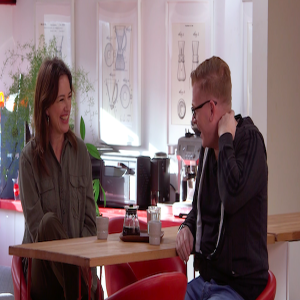
Saturday Mar 21, 2020
Episode 593: El Salvador Finca Los Andes Washed SL28
Saturday Mar 21, 2020
Saturday Mar 21, 2020
An In My Mug exclusive coffee sent only to subscribers on Friday the 20th of March, 2020.

Juan Jose Ernesto Menéndez Argüello belongs to the fourth generation of coffee farmers in his family. His father died in 1995, and after completing his studies at university he had the opportunity to start working in the coffee industry at J. Hill & Cia in 2000. After five years he left J. Hill & Cia to begin his second experience at JASAL. Both companies gave him the opportunity to meet “Grano de Oro” from another perspective, allowing him to learn the art and passion of cupping. He says those are very important in his life, and that they give him the opportunity to apply his coffee knowledge and experience gained through the years.
During his time in the coffee world, Neto has participated in various events like the Cup of Excellence (National Jury from 2003 to 2011), Q Auction, Q Grader, and the Star Cupper program organised by SCAA and CQI.
You can normally only taste coffee from this farm when it's roasted by Drop Coffee in Stockholm as it's an exclusive farm to them, however, as a special 1 off we reached out to Joanna and she very kindly agreed to share some Los Andes with us just for all you lovely In My Mug subscribers.
A super elegant and complex cup, this one makes me think of cloudy lemonade - there's even an effervescent acidity to it. It's got a creamy body where the lemon shifts into clementine, with a slight floral hint. On the finish, I get soft marzipan. This is a great example of what you can get from SL28 plants combined with the best Salvadorean soil.
- Country: El Salvador
- Department: Sonsonate
- Nearest City: Santa Ana
- Farm: Finca Los Andes
- Producer: Ernesto Menéndez
- Altitude: 1,720 m.a.s.l.
- Variety: SL28
- Processing System: Washed
CUPPING NOTES
Cloudy lemonade, clementine, floral, marzipan
Clean Cup: (1-8): 7
Sweetness: (1-8): 7
Acidity: (1-8): 7
Mouthfeel: (1-8): 6.5
Flavour: (1-8): 7
Aftertaste: (1-8): 6.5
Balance: (1-8): 6.5
Overall: (1-8): 7
Correction:(+36): +36
Total: (max 100): 90.5
Roasting Information
Medium - not too far! Keep this medium - through first at a steady pace and push it into the gap, dropping before you reach second.

Saturday Mar 14, 2020
Episode 592: Costa Rica Finca Licho Yellow Honey Geisha
Saturday Mar 14, 2020
Saturday Mar 14, 2020
Licho's is a coffee that I feel shows our development as a roaster over the years. We first bought this coffee in the Cup of Excellence program (a great way to meet a grower). Back then we bought it from an import broker; they helped us bring this coffee in because we were a small buyer. Now we buy directly from the farm!
Four years ago I went out to the farm and did the deal then and there with the brothers. I love the fact that I simply walked onto the farm after cupping a particular lot in the exporter's office, asked how much they wanted, and there was a short conference. They came back and told me how much they wanted, and we shook hands. Then we got back into the 4x4 and drove away. That year we agreed to a European-exclusive deal with them for this coffee, and this year we continue the close work we have been doing with them.
Grown by the Aguilera family in the province of Naranjo, in the volcanic Northern Cordiles corridor of the Western Valley, this coffee is cultivated at an altitude of 1,500 metres above sea level. Most of their coffee is either Villa Sarchi or Bourbon, but in recent years we've started to see other varietals from the farm.
The brothers work the mill and farms themselves. They have basically no hired labour, except for pickers during the harvest. With the help of the third generation, they work the mill and drying patios, prune the coffee fields, fertilise, and so on; and they do it all year round.
The Aguilera brothers understand quality at the farm and mill level, and this is why we are excited about working with them. Most of the siblings own farmland as well as co-managing the micro mill they installed eight years ago, which they built with the earnings from their fourth-place Cup of Excellence win in 2007. That's the year I first found the farm!
This coffee is yellow honey processed, which is just like the Pulped Natural method. The fruit is removed from the seed of the coffee bush and left to dry. The main difference is that there is no water involved when the cherry is removed, so mucilage sticks to the bean. This can be dangerous, but it's necessary in these parts of Costa Rica where water is limited: water is a precious commodity in this area of Naranjo, so this method suits the location very well.
The coffee ends up clustering whilst drying because there is so much mucilage. So the coffee either needs to be turned regularly to stop this happening, or it has to be broken up. Over-fermentation can happen at this stage and you can end up with a not-so-good cup, but the Aguilera brothers are well-versed in this method and are some of the most skilled in Costa Rica.
Want to know a little more about Honey processing? Here's a video you might enjoy!
Geisha is a varietal that has attracted lots of attention among coffee buyers and farmers, with some super high prices being paid for tiny lots. The name comes from the Gesha village in Ethiopia, where it’s said to have come from. I say 'said to' because it’s believed that coffee stock from this region made its way to Costa Rica (and then on to Panama) in the 1950s, but didn’t find much favour in its new home.
As with other experimental varietals that didn’t do particularly well, the plants were largely ignored or forgotten. Some grew wild or mixed into difficult-to-reach corners of farms. That means it’s difficult to be sure how close what we now call 'Geisha' is to those seeds from Ethiopia many years ago. Regardless, Geisha’s reputation suddenly hit the big time around 2004 as it attracted praise (and high prices) in the Taste of Panama competition, and it became a must-try for all you coffee geeks out there.
There has been talk of the name – Geisha vs Gesha – and we like to listen to the people that grew the coffee. It says 'Geisha' on our bags from the farm, so we're going with 'Geisha'.
It’s a spindly plant that needs quite a lot of space and care, but the distinctive floral flavours it delivers have seen it being planted more and more throughout Panama and Costa Rica. It's also slowly appearing in other countries where producers are looking to experiment with new varietals.
The Aguileras are a family of twelve brothers and sisters who are second-generation coffee producers in the West Valley. (Hermanos is used to describe mixed male and female siblings in Spanish, but literally translates to 'brothers' in English.) Their father was one of the first coffee growers in the area, and planted his farm 70 years ago. Neighbouring farmers warned him that coffee wouldn't grow there, but now the area is rich with coffee lands and his children work together to produce coffee.
Expect the classic floral notes of Geisha, but backed up by a silky body and big fruit sweetness and acidity. There's crisp green apple alongside juicy yellow plum before apricot takes over for the finish, and there's a squeeze of lemon in there too.
- Country: Costa Rica
- Region: Western Valley
- Province: Alajuela
- Nearest city: Naranjo de Alajuela
- Farm: Finca Licho
- Producers: Aguilera family
- Farm size: 28 hectares
- Coffee growing area: 9.10 hectares
- Altitude: 1,500 m.a.s.l.
- Varietal: Geisha
- Processing system: Yellow Honey
CUPPING NOTES
Green apple, yellow plum, apricot, lemon
Clean cup: (1–8): 6.5
Sweetness: (1–8): 7
Acidity: (1–8): 7
Mouthfeel: (1–8): 7
Flavour: (1–8): 8
Aftertaste: (1–8): 6
Balance: (1–8): 6
Overall: (1–8): 7
Correction:(+36): +36
Total: (max. 100): 90.5
Roasting Information
Medium-light – slow this down as it comes to the end of first to develop those big fruit flavours, but don't let it get too far into the gap and definitely nowhere near second.

Saturday Mar 07, 2020
Episode 591: Guatemala Finca La Soledad Washed 67-hour Fermented Caturra
Saturday Mar 07, 2020
Saturday Mar 07, 2020
Raul Pérez has grown up around coffee. He comes from a fifth-generation coffee farming family on his father's side, and a third-generation family on his mother's side. Coffee has always been part of his life. He has told me about the stories his grandparents shared with him about their experiences.
But I think it's fair to say that Raul has made plenty of his own coffee stories in his ten years of involvement in the specialty coffee industry.
It was ten years ago when Raul first became involved in the family business. After living in Guatemala City in his youth (so he was able to go to a good school and university), he returned to the farm where his family had still been working and commuting.
This coincided with a visit from an international buyer who made the family view coffee production in a different way. The speciality market was blossoming and the visitor gave them new ideas for varietals, picking, and processing that changed the direction of their farm and their cup quality. As Raul puts it, they began to work in a 'more interactive way'.
Finca La Soledad has been a Pérez family coffee farm since 1895. The farm is located in Acatenango, near to the Acatenango volcano. It has a great microclimate, and it's at an altitude of 1,650 metres above sea level.
The Pérez family invested heavily in their mill, rebuilding it with the environment in mind. They have a clever system with which they are able to recycle the water they use for processing many times.
The first time I met Raul was at a friend's wedding in Guatemala. I didn't know him (like most of the other guests), but we got talking and I enjoyed his company. At no time did he try to push his coffee on me, and I think only in passing did he say his family worked in coffee. Raul was so kind that he offered to take us back to our hotel that evening to save us having to get in a dodgy cab in Guatemala City.
I have an exporting partner in Guatemala who sent me an amazing sample, which I decided there and then we had to buy. It was only after I committed to buying the coffee that I found out it was from Raul's farm. Since then I've been lucky enough to visit the farm and meet the whole family. A fond memory that will stay with me is sitting on the unused drying patio with them all, enjoying a beer and watching the sun go down. They are a professional team and a lovely, warm family.
You want to know something else cool about La Soledad? They have an Instagram page! And they're really active on there too, so go have a look at what they're up to: https://www.instagram.com/fincalasoledad
Our coffees from La Soledad are washed coffees. This means they are soaked in water to remove the fruit from the beans. This fermentation process plays a key part in developing the flavours that make a great coffee into something special. It’s a super interesting (and complex!) part of the bean's journey from the plant to us, and one which clever producers like the Pérez family are really starting to explore and experiment with.
This lot has been fermented for 67 hours. The typical time for a dry fermentation would be 35–40 hours at 20°C to 26°C, so this has had about 30 hours longer than a typical dry fermentation on the farm. If a lot ferments for too long, it usually develops unpleasant flavours. This one hasn't, though; it’s super tasty!
This is possible because the team at La Soledad have got a clever trick to control the temperature. By running copper pipes around the tank and pumping cold water through those pipes, they can cool the fermenting beans down. This slows down the rate of fermentation, but it also changes the kind of flavour compounds the yeast and bacteria produce, allowing the fermentation to progress further without developing unpleasant flavours.
That’s all a bit clever, but what matters is how it tastes, right? Well, it really delivers on the sweet and clean flavours from that long, slow fermentation.
When I think of La Soledad, I think of a very refined coffee. That's exactly what you see here. It's delicate and very clean, and full of sugary sweetness that makes me think of a simple syrup. A white wine-like acidity balances that, and a hint of cocoa powder on the aftertaste adds complexity.
- Country: Guatemala
- Region: Acatenango
- Farm: La Soledad
- Farmer: Raul Pérez and family
- Altitude: 1,500 m.a.s.l.
- Variety: Caturra
- Processing system: Washed
- Fermentation: 67 hours
CUPPING NOTES
Sugar syrup, white wine, cocoa powder
Clean cup (1–8): 7
Sweetness (1–8): 6.5
Acidity (1–8): 6.5
Mouthfeel (1–8): 6
Flavour (1–8): 6
Aftertaste (1–8): 6
Balance (1–8): 6.5
Overall (1–8): 6.5
Correction (+36): +36
Total: (max. 100): 87
Roasting Information
Medium-dark – take this through first crack and give it time in between to develop the sweetness. You're looking for a fraction lighter than most Guatemalan coffees, so drop it just before second gets going.
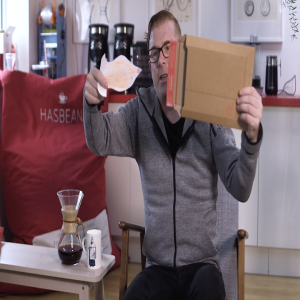
Saturday Feb 29, 2020
Episode 590: Bolivia Las Alasitas Washed Caturra
Saturday Feb 29, 2020
Saturday Feb 29, 2020
Las Alasitas is the biggest farm of Fincas Buena Vista in Caranavi where, every year, a festival is held in honour of Ekeko (iqiqu), the god of abundance. It has everything in miniature – but in abundance, just like him!
'Buy me!' said Alasitas. And well, we did! It's all in the name...
Las Alasitas (which literally translates to 'buy me' in Aymaran) is owned by the Rodriguez family, who have been doing some awesome things for coffee in Bolivia. They own their own mills, processing and exporting coffee for farmers in the Caranavi and Sud Yungas region. The family has been sourcing coffee from small coffee producers for three decades, but the steady decline of coffee production has put the sustainability of their export business in jeopardy. Without the intervention of people like the Rodriguez family, the future of coffee production in Bolivia is at risk of disappearing.
Back in 2014, the Rodriguez family bought land in the Caranavi region to showcase their practices and educate other producers in sustainable farming, as well as increasing the overall volume at their mills.
Caranavi is located just north of the department of La Paz city, 150 kilometres from the capital, and is the central hub of Bolivian coffee production. Its altitude and fertile soils make it perfect for producing brilliant and unique coffees.
The Rodriguez family prepared the land they bought across 20.6 hectares, where they planted Red Caturra, Java and Geisha. They’ve also introduced a sustainable model for the producers who supply them at their mill. They built this on three mantras: economical sustainability, social understanding, and environmental awareness – the Sol de la Mañana program.
The family decided that they could make a change and make things better. They have taken on the challenge of increasing the production of Bolivian coffee by planting their own new coffee plantations. They are currently also developing woodland on their farm to combat the ongoing issue of deforestation. What superstars!
Las Alasitas is a 20.6-hectare farm that's located at 1,550 metres above sea level in the Bolinda colony of Caranavi, Bolivia. Of those 20 hectares, 16 are used to grow coffee.
What a juicy coffee! It's smooth and silky in texture with a really upfront fruit sweetness, whilst the acidity is quite delicate. The fruit flavours shift as it cools, but I get sweet satsumas and a hint of passionfruit before swinging into peach on the aftertaste.
- Country: Bolivia
- Region: Yungas
- Municipality: Caranavi
- Colony: Bolinda
- Farm: Las Alasitas
- Altitude: 1,550 m.a.s.l.
- Farm size: 20.6 hectares
- Coffee growing area: 16 hectares
- Varietal: Caturra
- Processing method: Washed
- GPS: 15º46'43.07"S 67º32'53.06"O
CUPPING NOTES
Satsuma, passionfruit, peach
Clean cup (1–8): 6.5
Sweetness (1–8): 8
Acidity (1–8): 6
Mouthfeel (1–8): 6.5
Flavour (1–8): 6.5
Aftertaste (1–8): 6
Balance (1–8): 6
Overall (1–8): 6.5
Correction (+36): +36
Total: (max. 100): 88
Roasting Information
Medium-dark - keep a nice steady pace and you're looking for the very first pops of second in the cooling tray, no more!

Saturday Feb 22, 2020
Episode 589: Brazil Fazenda Cachoeira da Grama Pulped Natural Yellow Bourbon
Saturday Feb 22, 2020
Saturday Feb 22, 2020
This farm and its coffee sparked a massive change in what I thought I knew about coffee. I remember the first time I ever cupped this coffee: time stood still as the cup opened my mind to what great coffee is and can be. Gabriel de Carvalho Dias, the farmer, continues to produce great coffee year on year, and this coffee still holds a very special place in my heart.
Gabriel is one of Brazil’s leading agronomists. His family owns several farms, all of which border one another. Fazenda Cachoeira da Grama is 417 hectares in size – that’s 4 square kilometres! That sounds huge, but it’s not uncommon for farms to be more than 1,000 hectares.
Because of the mountainous terrain, however, only 64 hectares are planted with coffee, and it's all picked and maintained by hand. The mill is located close to the spa town of Poços de Caldas, which is 45 minutes away from the farm.
Fazenda Cachoeira da Grama has been in the Carvalho Dias family since 1890. It's located in São Paolo state, just three miles from the border with Minas Gerais state. It enjoys the typical characteristics of the mountainous Mogiana and Sul de Minas regions, and it's located at an altitude of 1,100–1,250 metres above sea level.
Their farm has a school, a club and a full-sized soccer field for the employees and workers, and 47 houses – all with modern facilities. The wastewater is treated in order to avoid polluting the stream that runs across the farm. The farm has a small hydroelectric plant, and the farmers only buy energy during the peak harvest.
As well as providing support to the workers, the family have also invested in the farm's coffee processing facilities. This has allowed them to produce one of the most consistent and delicious coffees. They grow mostly Yellow Bourbon, but also Canario and Mundo Novo. It's well-established plant stock, and some of the original Bourbon varietal trees are as much as 108 years old.
They’ve also invested in trying new things, including planting some new varietals and trialling new fermentation experiments with the involvement of experts from the University of Lavras (UFLA) in Minas Gerais.
The Carvalho Dias family consider social and environmental sustainability to be very important. The farm has a programme of planting native species of trees to maintain a better ecological balance.
This is a true classic for us. Once again this year it brings the milk chocolate and hazelnut that will be familiar to many of you! There's a little drizzle of caramel in there too, and a tiny shoulder of dried apricot on the finish. It's got a lovely texture that combines with the nuttiness to make me think of almond butter.
- Country: Brazil
- State: São Paulo
- Municipality: São Sebastião da Grama
- Farm: Fazenda Cachoeira da Grama
- Owner: Lidolpho de Carvalho Dias and family
- Altitude: 1,100–1,250 m.a.s.l.
- Processing: Pulped Natural
- Varietal: Yellow Bourbon
CUPPING NOTES
Milk chocolate, hazelnut, caramel, dried apricot, almond butter
Clean cup: (1–8): 6
Sweetness: (1–8): 7
Acidity: (1–8): 6
Mouthfeel: (1–8): 7
Flavour: (1–8): 6.5
Aftertaste: (1–8): 6
Balance: (1–8): 6.5
Overall: (1–8): 7
Correction: (+36): +36
Total (max. 100): 88
Roasting Information
Medium-dark – plenty of development and take it through the gap, but don't take this coffee into second.

Monday Feb 17, 2020
Episode 588: Guatemala El Limon Washed San Ramon
Monday Feb 17, 2020
Monday Feb 17, 2020
Due to a multiple hard disk drive failure, the original recording for this episode we sadly lost : ( however all was not lost! Steve and our friends at Tentacle Media worked over the weekend to record and edit a new recording and so without further ado, here we go!
I first discovered El Limon on my trip to Guatemala in early 2013. At the time we'd never bought coffee directly from Guatemala, but since then this has become one of our strongest and most amazing Hasrelationships.
My friend Raul (whom you may remember as the World Barista Champion of 2012!) in Guatemala had been buying coffee from these guys for a couple of years, and he was very keen for me to go and meet them. Located around an hour's drive to the east of Guatemala City in the small town of Palencia, this farm sits at an altitude between 1,600 and 1,800 metres above sea level. It's owned by Guadalupe Alberto Reyes, who's also just known as Beto. He used to be the Mayor of Palencia, and he helped to build and develop the town.
Palencia is not part of the eight regions of coffee as defined by Anacafé, but you can see a lot of development in the zone, and this farm is a perfect example of that development. I like being in places that are working to be hot and up-and-coming, as well as those that are established players.
One of the main reasons I love El Limon is Beto's desire to experiment; the farm mostly produces Bourbon and Caturra, but he also plays around with a few other varietals. The experimentation is thanks to Beto's motivation; he has really focused on the farm over the last few years. He wanted to take more care in every step they take – from picking to processing, to shipping – and also take more care in the agronomy of the farm.
This is very much a family affair: his wife and son also work on the farm, along with Beto's siblings. In fact, his son is studying agronomy at the local college for the benefit of the farm.
The dedication and care devoted to each step of production is reflected in the fact that the family has built a new wet mill, so that they can separate different lots and have control over the quality of the coffee. Previously the mill could process only one lot; now the farmers are able to process many lots, and keep separate days' pickings and varietals in their own parcels.
With this wet mill came another opportunity, which was for neighbours and people within the region of Palencia to bring their coffees to the mill where they could get them processed. It's another sign that this is a hot spot for Guatemalan coffee.
As time moves on, Beto doesn't want to stand still and is continuing to invest in the farm. He showed me lots of new planting during my recent visit, and a lot of building work around the wet mill. He is also building a QC lab and new accommodation for people working on the farm. It was a real hive of activity.
Beto and his family have always been the perfect hosts whenever I visited the farm. They are such welcoming people and take great pride in showing me around their farm. One of the kindest things they've done for me is to welcome me into their home when I am visiting, and they always prepare the most amazing meals! When you travel as much as I do, mid-trip you find yourself longing for something big, home-cooked, and not from a restaurant or roadside pop-up cafe. Traditional Guatemalan meals are just the ticket, and I always look forward to the food – but mainly I look forward to the company.
The Milky Bars are on me! Yep, it's a creamy, chocolatey cup that makes for great chugging coffee. There's a delicate acidity that reminds me of pear, and there's a little almond on the finish too.
- Country: Guatemala
- Region: Palencia
- Farm: El Limon
- Farmer: Guadalupe Alberto 'Beto' Reyes
- Altitude: 1,600 m.a.s.l.
- Varietal: San Ramon
- Processing method: Washed
CUPPING NOTES
Milky Bar, pear, almond
Clean cup: (1–8): 6
Sweetness: (1–8): 7
Acidity: (1–8): 6
Mouthfeel: (1–8): 6
Flavour: (1–8): 6.5
Aftertaste: (1–8): 6
Balance: (1–8): 6.5
Overall: (1–8): 6.5
Correction: (+36): +36
Total: (max. 100): 86.5
Roasting Information
Medium-dark – through first, keeping a nice steady pace and looking for those first pops of second as you drop the coffee into the cooling tray.

Saturday Feb 08, 2020
Episode 587: Bolivia Las Alasitas Washed Longberry
Saturday Feb 08, 2020
Saturday Feb 08, 2020
Las Alasitas is the biggest farm of Fincas Buena Vista in Caranavi where, every year, a festival is held in honour of Ekeko (iqiqu), the god of abundance. It has everything in miniature – but in abundance, just like him!
'Buy me!' said Alasitas. And well, we did! It's all in the name...
Las Alasitas (which literally translates to 'buy me' in Aymaran) is owned by the Rodriguez family, who have been doing some awesome things for coffee in Bolivia. They own their own mills, processing and exporting coffee for farmers in the Caranavi and Sud Yungas region. The family has been sourcing coffee from small coffee producers for three decades, but the steady decline of coffee production has put the sustainability of their export business in jeopardy. Without the intervention of people like the Rodriguez family, the future of coffee production in Bolivia is at risk of disappearing.
Back in 2014, the Rodriguez family bought land in the Caranavi region to showcase their practices and educate other producers in sustainable farming, as well as increasing the overall volume at their mills.
Caranavi is located just north of the department of La Paz city, 150 kilometres from the capital, and is the central hub of Bolivian coffee production. Its altitude and fertile soils make it perfect for producing brilliant and unique coffees.
The Rodriguez family prepared the land they bought across 20.6 hectares, where they planted Red Caturra, Java and Geisha. They’ve also introduced a sustainable model for the producers who supply them at their mill. They built this on three mantras: economical sustainability, social understanding, and environmental awareness – the Sol de la Mañana program.
The family decided that they could make a change and make things better. They have taken on the challenge of increasing the production of Bolivian coffee by planting their own new coffee plantations. They are currently also developing woodland on their farm to combat the ongoing issue of deforestation. What superstars!
Las Alasitas is a 20.6-hectare farm that's located at 1,550 metres above sea level in the Bolinda colony of Caranavi, Bolivia. Of those 20 hectares, 16 are used to grow coffee.
As far as we can tell, the Longberry varietal (also known as Java) is a Typica-type coffee because of its bean shape, as is the Geisha. Its physical appearance is a uniform seed that is elongated, and it has been described by several of our customers as an 'Ethiopian Long Berry type'.
A true marriage of classic flavours, from the Longberry varietal you'll get a hit of lemon zest and florals, but the Bolivian land it's grown on gives it extra depth and sweetness and reminds me of golden sugar. It finishes with a return to its distant Ethiopian heritage with a clean black tea flavour.
- Country: Bolivia
- Region: Yungas
- Municipality: Caranavi
- Colony: Bolinda
- Farm: Las Alasitas
- Altitude: 1,550 m.a.s.l.
- Farm size: 20.6 hectares
- Coffee growing area: 16 hectares
- Varietal: Longberry (Java)
- Processing method: Washed
- GPS: 15º46'43.07"S 67º32'53.06"O
CUPPING NOTES
Lemon zest, floral, golden sugar, black tea
Clean cup (1–8): 7
Sweetness (1–8): 7
Acidity (1–8): 7
Mouthfeel (1–8): 6
Flavour (1–8): 8
Aftertaste (1–8): 6
Balance (1–8): 6
Overall (1–8): 7
Correction (+36): +36
Total: (max. 100): 90
Brewing Tip
As this berry is long it will benefit from a slightly finer grind than you would use for a more regularly sized bean. Not as much as you would change things up for something like a Pacamara, but a little tweak finer should set you up for deliciousness.
Roasting Information
Medium - slow this down a little as you go through first and push it through the gap, but don't let it get close to second.

Saturday Feb 01, 2020
Episode 586: El Salvador Finca Las Brumas Washed SL28
Saturday Feb 01, 2020
Saturday Feb 01, 2020
Juan Jose Ernesto 'Neto' Menéndez Argüello belongs to the fourth generation of coffee farmers in his family. His father died in 1995. After completing his studies at university, Neto had the opportunity to start working in the coffee industry at J. Hill & Cia, in 2000. He left J. Hill & Cia after five years and began his second coffee experience at JASAL.
Both companies gave him the opportunity to meet 'Grano de Oro' from another perspective, allowing him to learn the art and passion of cupping. He says those are very important in his life, and that they give him the opportunity to apply his coffee knowledge and experience that he's gained through the years.
During his time in the coffee world, he has participated in various events like the Cup of Excellence (National Jury from 2003 to 2011), Q Auction, Q Grader, and the Star Cupper program organised by SCAA and CQI.
Las Brumas is located between 45 to 60 minutes from Santa Ana city. It has a cultivated area of 60 hectares' worth of coffee yield, all of which is at an altitude ranging from 1,450 to 1,700 m.a.s.l. It produces around 600 bags of coffee each year, and has an area of 35 hectares of virgin mountain at an altitude from 1,700 to 2,000 m.a.s.l.
The farm is located in the Sonsonate department near the area known as San Blas. Las Brumas has very rich volcanic soil, deep and very fertile, which has been generated by different Ilamatepec and Izalco volcanic eruptions throughout its history.
One of the most important elements is the microclimate. It's very misty at the farm for most of the year, and that's why Neto decided to name the farm Finca Las Brumas. This amazing micro climate is generated when the warm air from the Pacific ocean collides with the high peaks of the Volcanoes Park (which comprises of the Santa Ana, Cerro Verde and Izalco volcanoes).
Due to its location between these three famous volcanoes in El Salvador, this unique microclimate reduces the amount of daylight that the coffee trees receive. This helps the coffee trees have a very slow photosynthesis, improving the maturation process, and this, in turn, improves some attributes that are closely related to maturity, like the aroma, sweetness, acidity and flavour.
Sultana and lemon both jump out from this cup, but with a drizzle of a dark caramel coming through and adding an extra complexity to the fruit sweetness. As it fades, there's a hit of dark chocolate which lingers into the aftertaste.
- Country: El Salvador
- Department: Sonsonate
- Nearest city: Santa Ana
- Farm: Finca Las Brumas
- Producer: Juan Jose Ernesto 'Neto' Menéndez Argüello
- Varietal: SL28
- Processing system: Washed
- Altitude: 1,450–1,700 m.a.s.l.
- Type of soil: Sandy loam
- Average rainfall: 2,400mm
- Types of shade: Ingas, sunk, cipers and belloto
- Flora and fauna present: Mountain trees, wildflowers, deer, squirrels, armadillos, snakes
CUPPING NOTES
Sultana, lemon, dark caramel, dark chocolate
Clean cup: (1–8): 6.5
Sweetness: (1–8): 6
Acidity: (1–8): 6.5
Mouthfeel: (1–8): 6
Flavour: (1–8): 7
Aftertaste: (1–8): 6.5
Balance: (1–8): 6.5
Overall: (1–8): 7
Correction:(+36): +36
Total: (max. 100): 88
Roasting Information
Medium-dark - get this through the gap between cracks and slow it down a little, you're looking to catch the very early edge of 2nd as the roast drops out of the roaster.
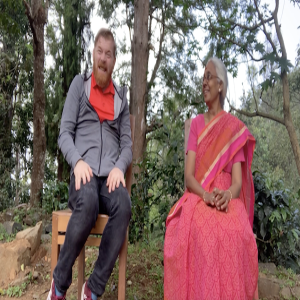
Saturday Jan 25, 2020
Episode 585: India Balmaadi Biodynamic Natural
Saturday Jan 25, 2020
Saturday Jan 25, 2020
We first came across Balmaadi Estate in India many years ago and loved the coffees. You did too, so it was really disappointing when we weren’t able to get hold of them any more.
Fast forward 9 years and we’ve been able to get it here again! It wasn’t an easy process, but it’s been a huge pleasure to see an old favourite return. More than that though, this time round we’ve been able to visit the farm and learn more than ever before about this unique place and what makes it so special.
As is so often the case, what makes it so special turns out to be the people. Balmaadi, as we know it today, owes a huge amount to one person - Unnamalai Thiagarjen. The farm had been in her husband’s family since the 1970s, but it was in 2003 that she took over running it. Totally new to coffee farming, she went off and studied, beginning to worry about how to make profitable a traditional farm in a region which is frequently cut off from access by monsoon weather. She realised that the fertilisers and pesticides most commercial farms used would be difficult to get and need lots of labour to apply (equally difficult in a remote region like this).
It was then that she came across the Biodynamic model, which she applied ever after. Combining Organic principles with spiritual ones, she’s made the most of her isolated location. This means making their own compost, foliar sprays and other treatments from the other plants and material on the farm. It was a great idea to take a challenge and make it into an opportunity - which in turn has produced an interesting and unique coffee.
They grow two varietals - Kent and S795. Both of these are common to India, but less common in other countries. Kent is a Typica mutation which is thought to have occurred in the early 20th Century in India, before being introduced in Kenya (where it has lost popularity to the SL varietals and Ruiru 11). S-795 is thought to be a cross of Kent with a Liberica/Arabica hybrid called S-288 (catchy name, right?) and has become popular in India and Indonesia for being quite resistant to Leaf Rust.
A big, gloopy coffee with loads of sultana and a sweetness which reminds me of marzipan. There's a little cherry jam in there too, which makes for a delicious and interesting balance. As it cools, the booziness really comes centre stage with a big hit of Armagnac.
- Country: India
- State: Tamil Nadu
- Region: Nilgiris
- Farm: Balmaadi Estate
- Owner: Unnamalai Thiagarajen
- Varietals: Kent and S795
- Process: Natural
- Certification: Biodynamic
- Drying Method: Patios and African beds
- Altitude: 1,200-1,830 m.a.s.l
- Farm size: 169 hectares, of which 148 hectares are coffee
CUPPING NOTES
Sultana, marzipan, cherry jam, Armagnac
Clean Cup: (1-8): 6
Sweetness: (1-8): 6.5
Acidity: (1-8): 6
Mouthfeel: (1-8): 6.5
Flavour: (1-8): 7
Aftertaste: (1-8): 6
Balance: (1-8): 6.5
Overall: (1-8): 6.5
Correction:(+36): +36
Total: (max. 100): 87
Roasting Information
Medium-dark - this needs to be pushed pretty hot to get the right level of development, just up to the first pops of second.

Saturday Jan 18, 2020
Episode 584: Guatemala Finca La Soledad Washed 90-Hour Fermentation Caturra
Saturday Jan 18, 2020
Saturday Jan 18, 2020
Raul Perez has grown up around coffee, he comes from a fifth-generation coffee farming family on his father's side, and a third-generation family on his mother's side. Coffee has always been part of his life. He has told me about the stories his grandparents would share with him about their experiences.
But I think it's fair to say that Raul has made plenty of his own coffee stories in his ten years of involvement in the specialty coffee industry.
It was ten years ago when Raul first became involved in the family business. After living in Guatemala City in his youth (so he was able to go to a good school and university), he returned to the farm where his family had still been working and commuting.
This coincided with a visit from an international buyer who made the family view coffee production in a different way. The speciality market was blossoming and the visitor gave them new ideas for varietals, picking, and processing that changed the direction of their farm and their cup quality. As Raul puts it, they began to work in a "more interactive way".
Finca La Soledad has been a Pérez family coffee farm since 1895, the farm is located in Acatenango, near to the Acatenango volcano. It has a great microclimate and an altitude of 1,650 metres above sea level.
The Pérez family invested heavily in their mill, rebuilding it with the environment in mind. They have a clever system through which they are able to recycle the water they use for processing many times.
The first time I met Raul was at a friend's wedding in Guatemala. I didn't know him (like most of the other guests), but we got talking and I enjoyed his company. At no time did he try to push his coffee on me, and I think only in passing did he say his family worked in coffee. Raul was so kind he offered to take us back to our hotel that evening to save us having to get in a dodgy cab in Guatemala City.
I have an exporting partner in Guatemala who sent me an amazing sample, which I decided there and then we had to but. I was only after I committed to buying the coffee that I found out it was from Raul's farm. Since then I've been lucky enough to visit the farm and meet the whole family. A fond memory that will stay with me is sitting on the unused drying patio with them all, enjoying a beer and watching the sun go down. They are a professional team and a lovely, warm family.
Our coffees from La Soledad are washed coffees - meaning they are soaked in water to remove the fruit from the beans. This fermentation process plays a key part in developing the flavours that make a great coffee something special. It’s a super interesting (and complex!) part of the beans journey from the plant to us and one which clever producers like the Perez family are really starting to explore and experiment with.
After picking, the cherries went into a steel tank with cold water. Raul controls the temperature whilst the coffee is fermenting as he found that by keeping it cooler he could allow the coffees to ferment for longer without any off flavours developing.
You want to know something else cool about La Soledad, they have an Instagram page! And they're really active on there too so go have a look at what they're up to https://www.instagram.com/fincalasoledad
I love it when a coffee tastes like a mug of cocoa, but this one takes it one stage further and tastes like you're dunking Oreos in you cocoa! It's all wrapped up by a creamy texture and a hint of red apple peel on the finish, but this is one for the chocolate lovers.
- Country: Guatemala
- Region: Acatenango
- Farm: La Soledad
- Farmer: Raul Perez and family
- Altitude: 1,500 m.a.s.l.
- Variety: Caturra
- Processing system: Washed
- Fermentation method: 90-hour
CUPPING NOTES
Hot chocolate, Oreos, red apple peel.
Clean cup (1–8): 7
Sweetness (1–8): 6.5
Acidity (1–8): 6
Mouthfeel (1–8): 6.5
Flavour (1–8): 6.5
Aftertaste (1–8): 6
Balance (1–8): 6.5
Overall (1–8): 7
Correction (+36): +36
Total: (max. 100): 88
Roasting Information
Medium dark - just through the gap between cracks and up to the start of second crack but don't let it get going.
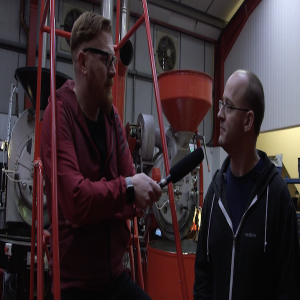
Saturday Jan 11, 2020
Episode 583: Bolivia Teodocio Mamani Organic
Saturday Jan 11, 2020
Saturday Jan 11, 2020
I first met Teodocio Mamani on my visit to Bolivia in 2012. Long story short: he's an amazing guy. We got talking about the photo we had of him in a Chelsea shirt, and then, of course, we started talking football. He had the Chelsea shirt because he played for a local team that played in blue, but I managed to convince him that he needed a shirt from a real team – so I sent him a Sunderland shirt!
Teodocio's farm sits in the municipality of Canton Uyunense in Caranavi, and is a mixed lot of red and yellow Catuai. Teodocio also has one hectare of land on his farm that is a natural forest reserve, in which he owns a house where he lives with his wife and two children.
Teodocio processes the majority of his coffee on his own farm. He uses a depulper that removes the cherry, then leaves the cherry to go through a dry fermentation process (anaerobic) for sixteen hours, and then runs it through the scrubber section of the pulper to remove the final remains of the mucilage. He then transfers the coffee to raised African beds, where it dries in around twelve days (depending on local weather conditions).
Like a number of the producers we work with, Teodocio is organic certified, but we haven't been able to sell his coffee as organic in previous years because we at Has Bean weren't certified. But 2019 is different, my friends: we're now organic certified (biodynamic coming soon too!). So we can gloriously now offer this coffee from Teodocio as organic, thanks to our own shiny new organic certificate.
I was talking to the exporter about Teodocio's picking methods, and he was explaining that the family uses a method called 'Ayne'. With this method the most mature fruits are harvested each day by hand, demanding the labour of 8–10 people (who are all Mamani family members) to pick selectively and correctly. But because of this he gets more coffee that he can sell as specialty grade, and the cup profile improves too. Teodocio is just as passionate about improving the cup quality as he is about his football!
Chocoholics, come on down! This one's just dark chocolate through and through. There's a little hit of cranberry, followed by a whisper of lime zest on the finish, but throughout it all the rich dark chocolate is the star.
- Country: Bolivia
- Region: Yungas
- Province: Caranavi
- Municipality: Canton Uyunense
- Farm: Teodocio Mamani
- Varietal: Caturra and Catuai
- Ripe cherry colour: Red and yellow
- Altitude: 1,600–1,750 m.a.s.l.
- Processing method: Mechanically Washed
- Fermentation method: Dry (anaerobic)
- Fermentation time: 16 hours
- Drying method: Raised African beds
- Drying time: 12 days
- Certification: Organic
CUPPING NOTES
Dark chocolate, cranberry, lime zest
Clean cup: (1–8): 6
Sweetness: (1–8): 6.5
Acidity: (1–8): 6.5
Mouthfeel: (1–8): 6.5
Flavour: (1–8): 6
Aftertaste: (1–8): 6.5
Balance: (1–8):
Overall: (1–8): 6.5
Correction: (+36): +36
Total (max. 100): 87.5
Roast Information
Medium-dark - this coffee isn't forgiving. It needs to go through first crack and then you need to slow it down. Get it up t the first pops of second to showcase the chocolate, but don't let second fully begin or it will burn quickly.
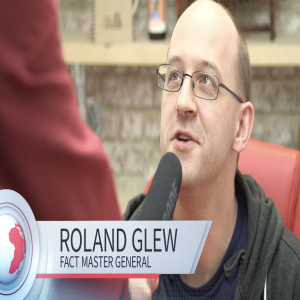
Saturday Jan 04, 2020
Episode 582: Guatemala El Limon Washed Bourbon
Saturday Jan 04, 2020
Saturday Jan 04, 2020
I first discovered El Limon on my trip to Guatemala in early 2013. At the time we'd never bought coffee directly from Guatemala, but since then this has become one of our strongest and most amazing Hasrelationships.
My friend Raul (whom you may remember as the World Barista Champion of 2012!) in Guatemala had been buying coffee from these guys for a couple of years, and he was very keen for me to go and meet them. Located around an hour's drive to the east of Guatemala City in the small town of Palencia, this farm sits at an altitude between 1,600 and 1,800 metres above sea level. It's owned by Guadalupe Alberto Reyes, who's also just known as Beto. He used to be the Mayor of Palencia, and he helped to build and develop the town.
Palencia is not part of the eight regions of coffee as defined by Anacafé, but you can see a lot of development in the zone, and this farm is a perfect example of that development. I like being in places that are working to be hot and up-and-coming, as well as those that are established players.
One of the main reasons I love El Limon is Beto's desire to experiment; the farm mostly produces Bourbon and Caturra, but he also plays around with a few other varietals. The experimentation is thanks to Beto's motivation; he has really focused on the farm over the last few years. He wanted to take more care in every step they take – from picking to processing, to shipping – and also take more care in the agronomy of the farm.
This is very much a family affair: his wife and son also work on the farm, along with Beto's siblings. In fact, his son is studying agronomy at the local college for the benefit of the farm.
The dedication and care devoted to each step of production is reflected in the fact that the family has built a new wet mill, so that they can separate different lots and have control over the quality of the coffee. Previously the mill could process only one lot; now the farmers are able to process many lots, and keep separate days' pickings and varietals in their own parcels.
With this wet mill came another opportunity, which was for neighbours and people within the region of Palencia to bring their coffees to the mill where they could get them processed. It's another sign that this is a hot spot for Guatemalan coffee.
As time moves on, Beto doesn't want to stand still and is continuing to invest in the farm. He showed me lots of new planting during my recent visit, and a lot of building work around the wet mill. He is also building a QC lab and new accommodation for people working on the farm. It was a real hive of activity.
Beto and his family have always been the perfect hosts whenever I visited the farm. They are such welcoming people and take great pride in showing me around their farm. One of the kindest things they've done for me is to welcome me into their home when I am visiting, and they always prepare the most amazing meals! When you travel as much as I do, mid-trip you find yourself longing for something big, home-cooked, and not from a restaurant or roadside pop-up cafe. Traditional Guatemalan meals are just the ticket, and I always look forward to the food – but mainly I look forward to the company.
The first thing that strikes me about this coffee is how well balanced it is. It starts with fruit sweetness and the flavour of sweet Golden Delicious apples. Then it shifts into brown sugar and hazelnut on the finish, and a sprinkle of cocoa on the aftertaste.
- Country: Guatemala
- Region: Palencia
- Farm: El Limon
- Producer: Guadalupe Alberto 'Beto' Reyes
- Altitude: 1,600 m.a.s.l.
- Varietal: Bourbon
- Processing method: Washed
CUPPING NOTES
Golden Delicious apples, brown sugar, hazelnut, cocoa
Clean cup: (1–8): 6
Sweetness: (1–8): 6.5
Acidity: (1–8): 6
Mouthfeel: (1–8): 6
Flavour: (1–8): 6.5
Aftertaste: (1–8): 6.5
Balance: (1–8): 7
Overall: (1–8): 6
Correction: (+36): +36
Total: (max. 100): 86.5
Roast Information
Medium-dark – through first crack and push this so you get the first pops of second as you drop, taking it far enough to let the complex sweetness shine whilst also keeping that balanced acidity.

Saturday Dec 28, 2019
Episode 581: Costa Rica Finca La Pira White Honey Catuai
Saturday Dec 28, 2019
Saturday Dec 28, 2019
La Pira is located in the high altitude Dota valley of the Tarrazu region: an area that's known for producing great coffees. This relatively young estate is only just over 50 years old and is owned by the founder’s son, Carlos Urena Ceciliano. He has worked on the farm for almost 20 years; however, he has worked in coffee all his life.
Coffee from La Pira first hit our radar back in 2009 thanks to the Cup of Excellence, and we were pleased to be reunited with the farm only recently after a lot of effort and hard work. A few years ago it was really rather tricky to get, stretching both Steve's pocket and patience, but it was well worth it. Thankfully all years after that it's been a little less stretchy!
After inheriting the family farm, Carlos worked for many years as a certified organic coffee producer, but he realised doing so was just not possible on this farm. Organic coffee is good, but not possible for everyone. The yield was very, very affected. So Carlos looked for alternatives, while still holding the organic principles very close to his heart. For instance, instead of using chemicals to control the weeds, sheep roam freely amongst the coffee plants and eat the weeds (and strangely leave the coffee plants alone). They work as automatic and mobile 'fertilisation units' (nature’s a wonderful thing). This has eliminated the need for herbicides. This is the kind of thinking Carlos has about coffee.
When Steve last visited La Pira, Carlos told him about how he wakes up in the middle of the night with an idea of how he can improve production, change the way the coffee is harvested and processed, or how systems can be improved upon. Steve too isn't the best sleeper and often suffers from this type of sleep deprivation relating to ideas popping into his head, so it was something that he could really empathise about.
During one of these late-night bursts of inspiration, Carlos thought that using the coldest water he could would be the best way of processing the cherry. During the night the Dota Valley gets a really sharp, cold breeze, and it runs through the whole farm. He had noticed the way the water on the mill roof, which sprinkled from processing, was almost frosting up. So he created a sprinkling system and a zinc ramp that the water runs across before hitting the cherries in the fermentation tank.
We've chased coffee from La Pira ever since we first had it all those years ago in 2009. Some years it's been super tough to get our hands on due to low yields and some other things, but via quite a bit of pestering the exporter we partner with in Costa Rica we've always managed to get our way!
You might have already noticed that we've got a different varietal and processing method combo from La Pira this year, in the past we've always had red honey processed Caturra but for 2019 we've got a white honey processed Catuai. Carlos does a really wide range of processes and a range of different varietals - during our las Hasvisit to Costa Rica, we cupped quite a few lots from the mill and this particular lot really stood out in blind cupping as being especially elegant, complex and just super delicious (and scored a point or so higher than the other lots we cupped). It just so happened this was this white honey Catuai rather than the usual red honey Caturra - one of the many reasons for going all the way to Costa Rica each year! : )
Expect an intensely sweet coffee, jam-packed full of fruit and white sugar. It's super complex, with hints of passionfruit and fresh blueberries alongside a delicate sherry note. On the aftertaste, this really shines as it just keeps on going and going, with papaya joining in. Overall, this is wonderfully balanced and one that you'll get something different from each sip.
- Country: Costa Rica
- Region: Tarrazú
- City: Santa María de Dota
- Farm: Finca La Pira
- Farmer: Carlos Ureña Ceciliano
- Farm size: 7 hectares
- Altitude: 1,650 m.a.s.l.
- Variety: Catuai
- Processing system: White Honey
CUPPING NOTES
White sugar, passionfruit, fresh blueberries, sherry, papaya
Clean cup: (1–8): 6.5
Sweetness: (1–8): 8
Acidity: (1–8): 6
Mouthfeel: (1–8): 6
Flavour: (1–8): 7
Aftertaste: (1–8): 8
Balance: (1–8): 7
Overall: (1–8): 6.5
Correction: (+36): +36
Total: (max. 100): 91
Roasting Information
Medium - keep this gentle, get through first crack, a little time in the gap then drop well before you approach second.

Saturday Dec 21, 2019
Episode 580: Festive Blend
Saturday Dec 21, 2019
Saturday Dec 21, 2019
The Hasbean festive tradition continues for its fourteenth year. Iiiiiiiiit's Chriiiiiiistmaaaaaaaas!
Each and every year since 2006 we've released Christmas blends to celebrate this wonderful time of year.
In previous years we've had separate filter and espresso blends, but for 2019 we're doing something different. This year there's just one blend that's designed to deliver a delicious cup of festive filter or seasonal espresso to help keep you going this December.
We don't roast our coffee for particular brew methods here at Hasbean. Instead, we take the roast to a place where we feel it really shines across all brew methods. We wanted 2019's Festive Blend to really show off this approach to roasting.
This blend will only be roasted throughout the month of December. It will disappear at the start of January – some fella in a red suit (no, not Steve!) said so.
So make sure to enjoy it while you can!
- 50% El Salvador Finca San José Washed Red Bourbon
- 30% Guatemala El Limon Natural Bourbon
- 20% Ethiopia Ana Sora Natural
The inspiration for our festive blend was the Christmas Pudding – and we think you’ll be able to tell. It’s sweet and sticky with dried fruit and brown sugar. We’ve departed from the traditional with a little glacé cherry in there too. It's all wrapped up with a sweet boozy hit of Grenadine.
CUPPING NOTES
Christmas pudding, sultana, glacé cherry, grenadine
Espresso Recipe Recommendation
Dose: 18.5g
Yield: 40g
Time: 35–38 seconds
Resting Recommendation
We recommend a 5-7 day rest after the date of roasting before brewing this coffee as espresso, but there's a lot of personal preference in that so, by all means, please brew whenever you like!
Roasting Information
Medium-dark – through first crack and then slow this down a little.You're looking to finish the roast around the end of the gap.
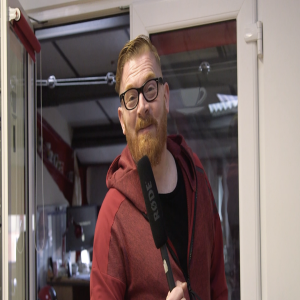
Saturday Dec 14, 2019
Episode 579: Kenya Muiri Estate AA Washed Organic
Saturday Dec 14, 2019
Saturday Dec 14, 2019
The Muiri Estate was founded in the late 1970s and is named after a local species of tree called pruners in the local Kikuyu language. Owned by the Mugiai family, Muiri is a rather big estate at 180 hectares with an on-site wet mill for processing, a dam and storehouse.
There are a whopping 156,000 trees producing coffee on the estate and they are predominantly a mix of SL28, SL34, K7 & Ruiru 11 - however, the estate is actively experimenting with other varietals and crops too, doing their best to be ready for the ever-changing climate and the challenges it brings with it.
The use of pesticides in Kenya is quite common but often a necessity to protect the trees from insect attacks, coffee diseases, funghi and the dry Kenyan climate. Over the last couple of years, Kenyan coffee production has been impacted by coffee berry disease (also known as CBD) and some really tough weather conditions.
Because of these things, we feel it's super important to be supporting an estate like Muiri as they're doing things differently to the rest (and we love different!). Production at the Muiri Estate is a lot more complex than many other farms in Kenya as they work completely organically, the Mugiai family are looking after their trees and estate incredibly carefully, for example manually pruning and stumping the trees regularly.
After the coffee is processed at the estate, it is separated by the size of the beans, AA, AB and PB. This is the biggest selection of the crop, which in Kenyan coffee grading is called AA.
This is zingy and sweet, a super clean and refreshing cup. Upfront I get white sugar with grapefruit and a little lime zest. There's a shoulder of gooseberry in there too, with a hit of blackcurrant really coming through on the finish and aftertaste.
- Country: Kenya
- Province: Central
- District: Thika
- Estate: Muiri Estate
- Altitude: 1,530 m.a.s.l.
- Producer: Mugiai Family
- Process: Fully washed
- Fermentation time: 48-72 hours
- Drying method: Raised beds
- Drying time: 15-21 days
- Varietals: SL28, SL34, K7 & Ruiru 11
- Grade: AA
- Certification: Organic
CUPPING NOTES
White sugar, grapefruit, lime zest, gooseberry, blackcurrant
Clean cup: (1–8): 7
Sweetness: (1–8): 7
Acidity: (1–8): 7
Mouthfeel: (1–8): 6
Flavour: (1–8): 6.5
Aftertaste: (1–8): 6
Balance: (1–8): 6
Overall: (1–8): 6.5
Correction:(+36): +36
Total (max. 100): 88
Roast Information
Medium – keep it pretty quick - through first, let it develop a little and aim to drop the roast towards the end of the gap but before second crack kicks off.
Brewing Tip
We're noticing that this coffee can tend to extract very easily versus others we are currently roasting. We recommend either a coarser grind than normal, shorter overall brewing time or lowering the amount of coffee you normally use to make a brew - our standard recommendation is 60g/l but try 55g/l and see what you think.
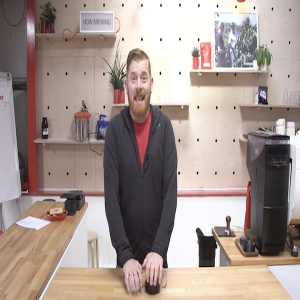
Saturday Dec 07, 2019
Episode 578: El Salvador Finca Las Brumas Washed Pacamara
Saturday Dec 07, 2019
Saturday Dec 07, 2019
This is an exclusive coffee only sent to In My Mug subscribers on December the 6th, 2019. I like to spoil you lovely lot whenever I can, and this week is 1 of those weeks! Only enough of this coffee to send out to IMM subscribers, so you're getting all of it, but afraid there’s sadly none to buy :(
Juan Jose Ernesto Menéndez Argüello belongs to the fourth generation of coffee farmers in his family. His father died in 1995, and after completing his studies at university he had the opportunity to start working in the coffee industry at J. Hill & Cia in 2000. After five years he left J. Hill & Cia to begin his second experience at JASAL. Both companies gave him the opportunity to meet “Grano de Oro” from another perspective, allowing him to learn the art and passion of cupping. He says those are very important in his life, and that they give him the opportunity to apply his coffee knowledge and experience gained through the years.
During his time in the coffee world, Neto has participated in various events like the Cup of Excellence (National Jury from 2003 to 2011), Q Auction, Q Grader, and the Star Cupper program organised by SCAA and CQI.
The farm, Las Brumas, is located between 45 to 60 minutes from the City of Santa Ana. It has a cultivated area of 60 hectares' worth of coffee yield, all of which is at an altitude ranging from 1,450 to 1,700 m.a.s.l. It produces around 600 bags of coffee each year, and has an area of 35 hectares of virgin mountain at an altitude from 1,700 to 2,000 m.a.s.l.
The farm is located in the Sonsonate department near the area known as San Blas. Las Brumas has a very rich volcanic soil, deep and very fertile, which has been generated by different Ilamatepec and Izalco volcanic eruptions throughout its history.
One of the most important elements is the micro climate. It's very misty for most of the year, and that's why Neto decided to name the farm Finca Las Brumas. This amazing micro climate is generated when the warm air when the Pacific ocean collides with the high peaks of the Volcanoes Park (Santa Ana volcano, Cerro Verde volcano and Izalco volcano). Due to its location between these three famous volcanoes in El Salvador, this unique micro climate reduces the amount of daylight that the coffee tree receives. This helps the coffee tree to have a very slow photosynthesis, improving the maturation process, and this in turn improves some attributes that are closely related to maturity, like the aroma, sweetness, acidity and flavour.
This coffee was produced as part of the brand new and super exciting Las Brumas Wild Coffee Project, the project is to use land for coffee producing that's forest, but to do it in a thoughtful and careful way so as not to remove any of the flora and fauna and so the space remains primarily a forest. This affects the speed of the growth of the coffee (lots of shade) but also provides it with its own fertilisation system, with all the forest floor goodness, and the constant supply of twigs and leaves to continue to enrich the soil.
This is lemon, lemon and lemon. Not just sharp lemon juice, but lemon marshmallow sweetness and lemon zest too. There's a little cocoa powder on the aftertaste, but this is always The Lemon Show.
- Country: El Salvador
- Department: Sonsonate
- Nearest City: Santa Ana
- Farm: Finca Las Brumas
- Farmer: Juan Jose Ernesto Menéndez Argüello
- Altitude: 1,450 - 1,700 m.a.s.l. / 1,700 - 2,000 m.a.s.l.
- Variety: Pacamara
- Processing System: Washed
CUPPING NOTES
Lemon juice, lemon zest, cocoa powder.
Roasting Information:
Medium Dark - Keep a steady pace through crack and drop the roast just before second gets going.

Saturday Nov 30, 2019
Episode 577: Guatemala El Limon Washed Pacamara
Saturday Nov 30, 2019
Saturday Nov 30, 2019
I first discovered El Limon on my trip to Guatemala in early 2013. At the time we'd never bought coffee directly from Guatemala, but since then this has become one of our strongest and most amazing Hasrelationships.
My friend Raul (whom you may remember as the World Barista Champion of 2012!) in Guatemala had been buying coffee from these guys for a couple of years, and he was very keen for me to go and meet them. Located around an hour's drive to the east of Guatemala City in the small town of Palencia, this farm sits at an altitude between 1,600 and 1,800 metres above sea level. It's owned by Guadalupe Alberto Reyes, who's also just known as Beto. He used to be the Mayor of Palencia, and he helped to build and develop the town.
Palencia is not part of the eight regions of coffee as defined by Anacafé, but you can see a lot of development in the zone, and this farm is a perfect example of that development. I like being in places that are working to be hot and up-and-coming, as well as those that are established players.
One of the main reasons I love El Limon is Beto's desire to experiment; the farm mostly produces Bourbon and Caturra, but he also plays around with a few other varietals. The experimentation is thanks to Beto's motivation; he has really focused on the farm over the last few years. He wanted to take more care in every step they take – from picking to processing, to shipping – and also take more care in the agronomy of the farm.
This is very much a family affair: his wife and son also work on the farm, along with Beto's siblings. In fact, his son is studying agronomy at the local college for the benefit of the farm.
The dedication and care devoted to each step of production is reflected in the fact that the family has built a new wet mill, so that they can separate different lots and have control over the quality of the coffee. Previously the mill could process only one lot; now the farmers are able to process many lots, and keep separate days' pickings and varietals in their own parcels.
With this wet mill came another opportunity, which was for neighbours and people within the region of Palencia to bring their coffees to the mill where they could get them processed. It's another sign that this is a hot spot for Guatemalan coffee.
As time moves on, Beto doesn't want to stand still and is continuing to invest in the farm. He showed me lots of new planting during my recent visit, and a lot of building work around the wet mill. He is also building a QC lab and new accommodation for people working on the farm. It was a real hive of activity.
Beto and his family have always been the perfect hosts whenever I visited the farm. They are such welcoming people and take great pride in showing me around their farm. One of the kindest things they've done for me is to welcome me into their home when I am visiting, and they always prepare the most amazing meals! When you travel as much as I do, mid-trip you find yourself longing for something big, home-cooked, and not from a restaurant or roadside pop-up cafe. Traditional Guatemalan meals are just the ticket, and I always look forward to the food – but mainly I look forward to the company.
This is a mash-up of dark chocolate with sweet and zingy citrus. It starts with peach and lemon, but it picks up a little grapefruit on the finish. The background of dark chocolate sticks with it throughout.
- Country: Guatemala
- Region: Palencia
- Farm: El Limon
- Producer: Guadalupe Alberto 'Beto' Reyes
- Altitude: 1,600 m.a.s.l.
- Varietal: Pacamara
- Processing method: Washed
CUPPING NOTES
Dark chocolate, peach, lemon, grapefruit
Clean cup: (1–8): 6.5
Sweetness: (1–8): 6
Acidity: (1–8): 7
Mouthfeel: (1–8): 6
Flavour: (1–8): 6.5
Aftertaste: (1–8): 6.5
Balance: (1–8): 6.5
Overall: (1–8): 6
Correction: (+36): +36
Total: (max. 100): 87
Brewing Tip
Pacamaras have a very unique size, density and structure, so don't expect them to grind like any other coffee. I find going a little finer than I normally would and allowing more time for the grinder to get its teeth into the bigger beans often leads to delicious results.
Roasting Information
Medium-dark – keep the pace steady through the crack and look for the first pops of second as you finish the roast.
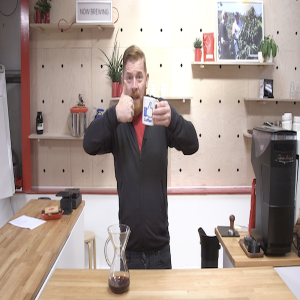
Saturday Nov 23, 2019
Episode 576: Nicaragua Finca Limoncillo Natural Red Bourbon
Saturday Nov 23, 2019
Saturday Nov 23, 2019
I've been telling the story of Hasbean and Finca Limoncillo for many, many years now. I don't intend to stop any time soon because it's such a big, big, big relationship for me. 😊
So much of where we are today has come from this relationship. I'm really proud of everything that's happened in the past, and super excited for where we can go in the future.
Our relationship with Finca Limoncillo began in 2007, and back then we were buying their delicious coffee as part of a buying group. I loved it from the very first time I cupped it, and it was a coffee I just had to get. It was only after the auction closed that I discovered it was owned by a family in Nicaragua who were already good friends of mine, and indeed probably the only people I knew from the whole country!
The following year I visited the farm with our importers, and I spent the whole trip begging them to bring the coffee into the UK for us. Eventually, thanks to my supreme Steve pester power, they caved in (probably just to stop the flow of emails and phone calls!) and kindly did so.
This setup worked well for a time, but we received notice a couple of years ago that the importers were not going to be buying the coffee again (and for reasons other than the cup quality). This led to some frantic phone calls and a thorough search down the back of the sofa for loose change to fund buying twelve months’ worth of coffee all at once. There were many, many obstacles in the way of doing this deal, but we were lucky in that we were able to pull everything together in a very short amount of time.
The upside of all of this is that we now work directly with Finca Limoncillo instead of going via anyone else, and this is a relationship I’m super happy to have. This coffee has gone from a one-off Cup of Excellence buy to a fantastic long-term relationship that I'm so very proud to have.
Finca Limoncillo is located in Matagalpa and, at 171 hectares in size, it. is. huge! Situated at an amazing location, it boasts nine waterfalls within the farm and is owned by the Mierisch family; as I have already said, they’re good friends, and also well-respected producers in Nicaragua. They’re known for their experimental processing, varietal work, and exceptional coffee.
The fact that the family are friends helps us drill down into the details of what they do for the people who work for them. The information continues to prove to me that good people grow good coffee.
This is lovely and balanced natural with plenty of currants and slices of dried apple upfront, before Muscovado sugar is liberally sprinkled over the top.
- Country: Nicaragua
- Municipality: Yasica Norte
- Region: Matagalpa
- Farm name: Limoncillo
- Producers: The Mierisch Family
- Farm size: 171 manzanas (hectares)
- Coffee growing area: 109 hectares
- Altitude: 1,200 m.a.s.l.
- Varietal: Red Bourbon
- Processing method: Natural
CUPPING NOTES
Currant, dried apple, Muscovado sugar
Clean cup: (1–8): 6.5
Sweetness: (1–8): 6.5
Acidity: (1–8): 6.5
Mouthfeel: (1–8): 6
Flavour: (1–8): 6.5
Aftertaste: (1–8): 6
Balance: (1–8): 6.5
Overall: (1–8): 6.5
Correction: (+36): +36
Total: (max. 100): 87
Roast Information
Medium - through first and slow it down just a little, dropping near the end of the gap or with the very first pops of second - no further!

Saturday Nov 16, 2019
Episode 575: El Salvador Finca San José Washed Red Bourbon
Saturday Nov 16, 2019
Saturday Nov 16, 2019
Finca San José is very much the pride and joy of the Rodríguez family and is now in the hands of a fourth and fifth generation of coffee producers. The story begins in 1815 when José María Rodriguez and Josefina Rodriguez (great-grandparents) planted the first coffee trees with their own hands.
Through the generations, the farm has passed through the hands of many committed farmers like José's son, Israel Rodriguez. He was then followed by Jose Maria Rodriguez, who took care of the farm until it came to Gloria Mercedes Rodriguez Fontán, the most recent owner.
Ever the strong woman, Gloria has overcome gender barriers in an industry that has historically been the province of men, and she personally supervises every step at the farm level. Gloria not only takes care of San José but, together with her siblings' support, she manages five other small farms which collectively add up to 38 hectares.
The mountain slopes of Finca San José are fully shaded by trees that help to maintain and preserve the crop and the surrounding environment. In addition to the trees' diversity, the farm is home to a variety of wild animals and birds, which can be seen in their natural habitat. San José is nested in the northwestern slope of an extinct volcanic crater, which holds a small lagoon inside it. The lagoon is named Nymph Lagoon, due to the abundance of water lilies.
At Finca San José, coffee goes through extensive quality control in addition to being grown under standards that support specialty coffee production. The unique microclimate conditions include an average altitude of 1,500 metres above sea level, an average temperature of 17°C, and rich and loamy clay soil; and the coffee grown is mainly Bourbon.
One of our most consistent coffees, this year it again delivers milk chocolate alongside dark cherries. Those two classic flavours are joined by almond on the finish, for a really more-ish result.
- Country: El Salvador
- Department: Ahuachapán
- Municipality: Apaneca
- Nearest city: El Saitillal
- Farm: Finca San José
- Owner: Gloria Mercedes Rodriguez Fontán
- Farm manager: Antonio Avelino
- Processing method: Washed
- Varietal: Red Bourbon
- Altitude: 1,500 m.a.s.l.
CUPPING NOTES
Milk chocolate, dark cherry, almond
Clean cup: (1–8): 6.5
Sweetness: (1–8): 7
Acidity: (1–8): 6
Mouthfeel: (1–8): 6
Flavour: (1–8): 7
Aftertaste: (1–8): 6
Balance: (1–8): 6.5
Overall: (1–8): 6.5
Correction: (+36): +36
Total: (max. 100): 87.5
Roasting Information
Medium-dark - through first crack and then slow this down a little, you're looking to finish the roast around the end of the gap.

Saturday Nov 09, 2019
Episode 574: Nicaragua Finca Limoncillo Washed Red Pacamara Peaberry
Saturday Nov 09, 2019
Saturday Nov 09, 2019
I've been telling the story of Hasbean and Finca Limoncillo for many, many years now. I don't intend to stop any time soon because it's such a big, big, big relationship for me. 😊
So much of where we are today has come from this relationship. I'm really proud of everything that's happened in the past, and super excited for where we can go in the future.
Our relationship with Finca Limoncillo began in 2007, and back then we were buying their delicious coffee as part of a buying group. I loved it from the very first time I cupped it, and it was a coffee I just had to get. It was only after the auction closed that I discovered it was owned by a family in Nicaragua who were already good friends of mine, and indeed probably the only people I knew from the whole country!
The following year I visited the farm with our importers, and I spent the whole trip begging them to bring the coffee into the UK for us. Eventually, thanks to my supreme Steve pester power, they caved in (probably just to stop the flow of emails and phone calls!) and kindly did so.
This setup worked well for a time, but we received notice a couple of years ago that the importers were not going to be buying the coffee again (and for reasons other than the cup quality). This led to some frantic phone calls and a thorough search down the back of the sofa for loose change to fund buying twelve months’ worth of coffee all at once. There were many, many obstacles in the way of doing this deal, but we were lucky in that we were able to pull everything together in a very short amount of time.
The upside of all of this is that we now work directly with Finca Limoncillo instead of going via anyone else, and this is a relationship I’m super happy to have. This coffee has gone from a one-off Cup of Excellence buy to a fantastic long-term relationship that I'm so very proud to have.
Finca Limoncillo is located in Matagalpa and, at 171 hectares in size, it. is. huge! Situated at an amazing location, it boasts nine waterfalls within the farm and is owned by the Mierisch family; as I have already said, they’re good friends, and also well-respected producers in Nicaragua. They’re known for their experimental processing, varietal work, and exceptional coffee.
The fact that the family are friends helps us drill down into the details of what they do for the people who work for them. The information continues to prove to me that good people grow good coffee.
This is a Pacamara varietal coffee. Pacamaras are a little crazy on the cupping table. Pacamaras are exciting. I like Pacamaras! I could ramble on about Pacamaras for a while ... oh, wait a minute, I did! If you'd like to know more about this fantastic varietal, make sure to have a look at the article I wrote ...
As well as being a big ol' Pacamara, this is also a lil' ol' Peaberry; a thing that's normally big is a little smaller than you might expect. It's an interesting mix of unusual sizing that I hope you'll enjoy.
Normally the seed of the coffee fruit grows into the green bean that we all know and love from two fertilised seeds inside each fruit, but sometimes things are a little different and a Peaberry is born. When only one of the two seeds is fertilised, it produces a smaller bean that looks like a shrunken version of what we'd normally know as a coffee bean, and that's because only one seed has grown instead of two.
Some say Peaberry coffees are sweeter and more delicious than their regular cousins; some people even come to us specifically looking for these coffees because they crave them so much! I'll let you be the judge.
This reminds me of a Custard Cream biscuit - super sweet with a hint of vanilla in the background. There’s just a shoulder of hops in there too, along with a delicate orange acidity which balances it all beautifully.
- Country: Nicaragua
- Municipality: Yasica Norte
- Region: Matagalpa
- Farm name: Limoncillo
- Producers: The Mierisch Family
- Farm size: 171 hectares
- Coffee growing area: 109 hectares
- Altitude: 1,200 m.a.s.l.
- Varietal: Pacamara Peaberry
- Processing method: Washed
CUPPING NOTES
Custard Cream, vanilla, hops, orange
Clean cup: (1–8): 6.5
Sweetness: (1–8): 7
Acidity: (1–8): 6
Mouthfeel: (1–8): 6.5
Flavour: (1–8): 7
Aftertaste: (1–8): 6
Balance: (1–8): 6
Overall: (1–8): 6
Correction: (+36): +36
Total: (max. 100): 87
Roast Information
Medium to medium-dark - through first and try to keep a steady increase in temperature, looking for the very first pops of second on the drop, no more!
Brewing Tip
Pacamaras have a very unique size, density and structure so don't expect them to grind like any other coffee. As this is a Pacamara peaberry they're different even to normal Pacamaras too #tricky
I find going a little finer than I normally would + allowing more time for the grinder to get its teeth into the bigger beans often leads to delicious results. Not quite as far as you'd push your grind for a regular Pacamara but still make sure to tweak what you're doing to help this coffee show off it's natural awesomeness.

Saturday Nov 02, 2019
Episode 573: Kenya Kiriga Estate AA Washed
Saturday Nov 02, 2019
Saturday Nov 02, 2019
The first coffee bush at Kiriga Estate was planted in approximately 1954 by colonial settlers. At about the same time, less than ten kilometres away along the same Kigio road, a young boy (Aloysius Gakunga, son of the chief for the larger Murang'a county) helped his father – Senior Chief Ndungíu Kagori – plant the first coffee seedling in the area. The area was known as Gaitegi village, Muranga Location 1 (Loco One). A love affair with coffee had been born!
Several years went by and the young boy grew up. He was riding his bicycle along Kigio road and, as he rode past the vast – by now well-established – coffee estates, he promised himself that he would one day own one of them.
He realized this dream in 1976.
The boy, or Mr A. N. Gakunga, sadly passed away in July 2014. By the time of his death, Mr Gakunga had passed his love of coffee and the mantle of Kiriga coffee estate on to Dr Brian Ndungíu Gakunga. Brian was his second child, and the eldest son out of his six children. According to Kikuyu cultural naming systems, Brian is named after Mr Gakungaís' father, who was both his grandfather and his pioneer coffee farmer.
- Dr Brian Gakunga is a coffee farmer who is well known in Kenyan coffee circles. He is a founding member and a former long-serving Honorary Secretary of the Kenya Coffee Producers Association, which is a national farmers' organisation that works to promote the economic and social interests of the coffee farmers through active participation in the national and international arena.
- Brian is also a former Board Member and Chairman of Transitional Exchange Committee (operationally, he was the then-Chairman of Nairobi Coffee Exchange), where over 90% of all of Kenya's coffee is currently sold. He's also currently the Founding Chairman of Africa Coffee Farmers' Network.
- Africa Coffee Farmers' Network represents the interests of coffee farmers, as spelt out in the organisation's core objective of improving the earnings of poor coffee farmers in order to break the vicious cycle of poverty. One way of doing this is by getting direct sales for the farmers.
Kiriga Estate sits between 1,550 and 1,650 metres above sea level. It is approximately five kilometres from Thika town, which is an industrial town in the central province of Kenya. It's four kilometres from Blue Posts hotel, which has the famous Chania and Thika falls. Thika lies 50 kilometres northeast of Nairobi.
Administratively, Kiriga coffee estate is in the Gatanga constituency of Muranga county, and it's separated from Kiambu county by the Chania river.
Kiriga coffee is Arabica of predominantly SL28 variety (notable for its world-renowned cup quality). The farm has an estimated two hectares of Ruiru 11 variety (which has improved resistance to coffee berry disease and leaf rust); some K7 variety (similar characteristics as SL28, but with better resistance to leaf rust compared to SL28); and a field of the newest Batian variety. About 60% of the coffee that the estate produces is AA/AB.
All coffee activities at Kiriga are carried out at a factory level, from the coffee nursery to all the farm operations (pruning, weed control, nutrition, irrigation, basin digging, disease control, infilling, mulching, and planting). Wet mill operations are also carried out on the factory level. Kiriga delivers both parchment coffee and Mbuni (naturals) to the commercial dry mill for milling and grading, in preparation for sale at coffee auctions and via indirect sale.
In addition to growing coffee the estate also has, I was told, shoats (sheep and goats), a dairy, and the potential to keep fish. It's all about diversity, and what's more diverse than a 'shoat'?! The estate is also occasionally visited by two hippos, in addition to some bird-life, while also being the home of a family of monkeys.
Kiriga irrigated all its coffee trees – despite the crippling electricity costs involved – during the dry season, in order to ensure their high standards were maintained despite the weather.
By the end of 2015, the estate had changed the cycle of its coffee trees by removing the old heads and growing new heads, which in return gave a higher yield of bold beans with the characteristic 'Kiriga coffee characteristics'. Over 40% of the 'old heads' had to go! This is way above the recommended 25%, and we expect to have decreased yield but increased quality as a result.
At Kiriga they talk about having a 'Kiriga Family'. It's a big family that includes up to 180 people at the busiest times of year! Thirty percent of the total workforce is made up of resident families who live on the estate. Fifty percent of those know no other home. The remaining percentage consists of smallholder farmers who commute daily and depend on the estate for survival. There are smallholder farmers who have been part of the family since 1976 and have no desire to work anywhere else, commuting a whopping 10 KM (or more!) daily – past other estates – just to work at Kiriga.
Something really amazing I wanted to tell you about is the Kiriga Welfare Fund. In the past, the estate saw its workers get turned away from banks when they tried to acquire loans for dealing with family issues or emergencies. To help his 'Kiriga Family', Brian encouraged the workers to set up a welfare group with him as its patron, and Brian has provided money for loaning out to staff according to their most pressing needs.
Many of the estate farms around Kiriga have been sold off to make housing estates. Whilst this is a challenge for the future, in the immediate period Brian is actually finding it helpful, because there are more skilled pickers available (who were working on the other farms).
During my visit to Kenya in 2015, I was fortunate enough to spend some time chatting with Brian. I even managed to record some of it, too! Make sure to have a listen. 😊
Hasblog: An Interview with Brian and Peter from Kiriga (Part 1)
Hasblog: An Interview with Brian and Peter from Kiriga (Part 2)
In the cup this is fruit squash! It starts with blackcurrant, but seamlessly morphs into orange. There is a shoulder of fresh strawberry in the background. It's super clean and super refreshing.
- Country: Kenya
- Constituency: Gatanga
- County: Muranga
- Nearest town: Thika
- Estate: Kiriga
- Farmer: Dr Brian Gakunga
- Altitude: 1,550–1,650 m.a.s.l.
- Varietals: SL 28 AA and Ruiru 11 AA
- Processing method: Washed
CUPPING NOTES
Blackcurrant, orange, strawberry
Clean cup: (1–8): 8
Sweetness: (1–8): 6.5
Acidity: (1–8): 7
Mouthfeel: (1–8): 6
Flavour: (1–8): 7.5
Aftertaste: (1–8): 6
Balance: (1–8): 6
Overall: (1–8): 7
Correction:(+36): +36
Total (max. 100): 90
Roast Information
Medium – keep it pretty quick, through first crack and into the gap; then drop it, really showcasing the acidity.
Brewing Tip
We're noticing that this coffee can tend to extract very easily versus others we are currently roasting. We recommend either a coarser grind than normal, shorter overall brewing time or lowering the amount of coffee you normally use to make a brew - our standard recommendation is 60g/l but try 55g/l and see what you think.

Saturday Oct 26, 2019
Episode 572: Costa Rica Don Joel Finca Carmela Red Honey Villa Sarchi
Saturday Oct 26, 2019
Saturday Oct 26, 2019
The Don Joel Micromill is owned by Allan Oviedo Rodriguez and his family. Right on the border between the Central and Western Valleys in Costa Rica, Allan has been producing coffee there for 18 years. Growing up in a coffee family, Allan learnt the traditional producing methods with his father (Don Joel) and brothers but also saw the difficulties this lifestyle had, with poor returns and increasing cost of living.
When his father passed away, the farms were split up between the family and Allan, working the La Cumbre farm, decided to change how he did things. Building the micromill he named for his father, he set about replanting with a focus on taste quality. It's no surprise that the varietals he chose will be familiar from our range - Caturra, Catuai and Villa Sarchi.
With a mix of a willingness to try new things, an eye for detail and the ability to learn quickly, Allan was able to build a great reputation for consistently and cleverly grown and processed coffees.
A few years ago, Allan was able to invest in expanding his growing area and added this farm - Carmela - alongside La Cumbre. Despite a difficult year for coffee growing in the Western Valley (with high temperatures, unseasonal rain and ash from Poás volcano among the challenges), Allan managed to get a great crop from Carmela.
Carmela is a 3-hectare farm, planted mostly with Villa Sarchi and some Typica. Situated around 1600 masl, it's only 5 minutes drive from La Cumbre but on the opposite edge of the hill. Even in these short distances, Allan's noticed significant differences in the weather, giving each farm it's own character.
Like many producers in Costa Rica, Allan works in a semi-organic way - reducing the use of sprays as much as possible. One of the tricks he does to help this is creating his own fertiliser, using native microorganisms to create a base before including some trace nutrients for the plants which he can then spray on.
This has got a really intense sweetness which reminds me of boiled sweets. There's a big hit of red apple and it finishes with a spoonful of white sugar.
- Country: Costa Rica
- Region: Western Valley
- Nearest City: San Luis de Grecia
- Farm: Finca Carmela
- Micromill: Don Joel
- Producer: Allan Oviedo Rodriguez and family
- Altitude: 1,600 m.a.s.l.
- Processing method: Red Honey
- Varietal: Villa Sarchi
CUPPING NOTES
Red apple, boiled sweets, white sugar
Clean cup: (1–8): 6
Sweetness: (1–8): 7
Acidity: (1–8): 6.5
Mouthfeel: (1–8): 6
Flavour: (1–8): 6
Aftertaste: (1–8): 6
Balance: (1–8): 7
Overall: (1–8): 6.5
Correction:(+36): +36
Total (max. 100): 87
Roast Information:
Medium - nicely through first crack and develop it right to the cusp of second before you drop it.
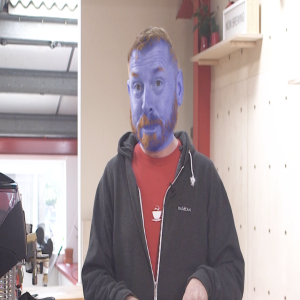
Saturday Oct 19, 2019
Episode 571: Ethiopia Ana Sora Natural
Saturday Oct 19, 2019
Saturday Oct 19, 2019
We're now into our fourth wonderful year of having coffee from Ana Sora, and I'm as excited this year as I was back in 2016! This coffee represents lots of time and energy working at the farmer's gate in Ethiopia, and it's one of the most unique coffees I've ever tasted.
My inbox has been full of emails asking for more, more, more Ana Sora! Well, here you go folks. 😀
We also have a washed version of the same coffee, which you can find here. Make sure you try them side by side if you get the chance, so you can enjoy the delicious variations that the different processing methods bring to the cup.
This private farm is owned by Israel Degfa, a second-generation coffee grower from Ethiopia and as coffee farms go, it's a very new farm: it was only formed in 2013. It's located at a whopping altitude of between 1,900 and 2,350 metres above sea level. It's a gorgeous but somewhat tiring walk to get there! (It's not all just holiday snaps, this coffee buying malarkey!)
Situated alongside the river Turo, the farm used to only produce naturally processed coffee. However, over the last year, the farmers have taken advantage of the water source and have begun producing washed coffee too.
It is unusual to find private farms of 250 hectares in Ethiopia, and even more unusual to find them at such high altitudes. The altitude helps with the slower maturation of the coffee cherry and allows more time for the plant to develop, which contributes to the super unique cup profile we see in coffees from Ethiopia.
Coffee growing is popular in this area, and Israel also sources coffee from the surrounding area. That area is populated by smallholder farmers who speak Oromife and are of Oromo ethnicity. Israel believes in helping these farmers through education in husbandry, and also through financial assistance.
Cherries are hand-sorted for unripes and overripes before they go into floatation tanks, where they're covered with water. Any cherries that float are removed. Whole, ripe cherries are then dried in the sunshine on raised African drying beds, which are laid out on hessian cloths for about 15–18 days depending on the weather conditions. The cherries are covered with plastic or shade nets during the midday heat and at night.
It's a unique coffee from a unique relationship, and I'm massively excited to share this coffee with you once again.
Do you like blueberries? I hope so!!! This coffee is all about the blueberries: think drinking blueberry juice whilst eating a blueberry muffin. It's not just the flavour of blueberry though. It's got a silky texture that reminds me of fruit juice, and a delicate lemon zest on the aftertaste, which is a perfect complement to all the blueberries.
- Country: Ethiopia
- Area: Guji zone
- Nearest town: Yirgacheffe
- Farm: Ana Sora
- Varietal: Indigenous wild varietals
- Processing: Natural
- Owner: Israel Degfa
- Founding year: 2013
- Altitude: 1,900–2,350 m.a.s.l.
- Farm size: 250 hectares, of which 150 hectares are coffee
CUPPING NOTES
Blueberry juice, blueberry muffin, lemon zest
Clean cup: (1–8): 7
Sweetness: (1–8): 7
Acidity: (1–8): 6.5
Mouthfeel: (1–8): 7
Flavour: (1–8): 8
Aftertaste: (1–8): 6.5
Balance: (1–8): 6
Overall: (1–8): 8
Correction: (+36): +36
Total: (max. 100): 92
Roasting Information
Medium – through first crack and into the gap. For more fruit, drop this mid-way through the gap; for more of that silky body, extend the roast slightly and drop just before second gets going.

Saturday Oct 12, 2019
Episode 570: Nicaragua Las Delicias Washed Longberry
Saturday Oct 12, 2019
Saturday Oct 12, 2019
This farm was brand new to us only a few years ago, and we're really happy to have been able to continue getting coffee from Las Delicias every year since. Although the farm itself is still relatively new to us, the people behind it most certainly aren't. In fact, we've been working with them for over ten years now.
The Mierisch family (whom you may remember from such farms as Limoncillo, Mama Mina, Escondida and Milligros) have worked with us over that time to bring us delicious coffee, and continue to do so year after year. 😊
Much of that deliciousness is thanks to their amazing processing, and Eleane Mierisch is in charge of that. She works in the family business, but she's never owned her own farm. Never, that is, until two years ago, when she acquired Las Delicias all for herself.
The farm is located in the region of Jinotega at an average altitude of 1,450 metres above sea level. It's located next to another Mierisch farm that you might have heard of, which is called San José. We've had coffee from there a few times; we're definitely hoping to see more in the future, too.
Eleane knows the area very well, and she knows the land and what it's capable of producing. Add to this her passion for coffee, and you can start to understand why she wanted to produce coffee on a farm of her own.
The Longberry varietal is the fruit of some of the amazing experimental work that's taking place at Limoncillo, another Mierisch farm (as if I even need to tell you that!) To explain a little bit of the story behind it, I'll hand over to another Mierisch that I just so happen to know. Oh hi there, Erwin!
Here my 'story' begins back in mid-2001. I sound like a grandfather ...
My father and I were coming back from visiting some top farms in Nicaragua, as we sometimes did – and do – in order to learn from our neighbours. If we discover anything worthwhile, we then implement those things to improve efficiency and quality on our own farms.
As we drove past the UNICAFE experiment station Juanetillo, which had gone under, a man on the side of the road flagged us down and explained to us how the experiment station had closed down and that his 'severance' was tools and coffee seeds since they did not have the cash to pay him. He asked if we would be interested in helping him out by purchasing these items off of him. In all honesty, I was not very happy that my father forced me to stop to see what this man wanted; therefore, I was not very receptive to his offer, but I purchased a bag of seeds and old beaten up shovels. I gave no immediate thought to the 20 lb bag of coffee seeds that was labelled as JAVA.
My father later showed these seeds to our then-supervising agronomist Ing. Patricia Contreras, who had worked at that research station, and she was ecstatic. She told us about how great this coffee was, but also that it was not very productive nor resistant to disease, as she recalled from running this study at Juanetillo back in the '80s. She also said that the real name for it is Longberry, and that it has its roots in Ethiopia.
We began to run some more experiments – various altitudes and processing methods – and have been learning how to manage it since.
As far as we can tell the Longberry varietal is a Typica-type coffee because of its bean shape, as is the Geisha. Its physical appearance is a uniform seed that is elongated and has been described by several of our customers as an 'Ethiopian Long Berry type'.
The first thing I get with this coffee is the texture – it's creamy. That's backed up by the flavour of single cream, but sitting alongside a clean pear. On the finish it's got a little dark chocolate too, delivering a very elegant cup.
- Country: Nicaragua
- Municipality: Lipululu
- Region: Jinotega
- Farm name: Las Delicias
- Farmer: Eleane Mierisch
- Farm size: 20 manzanas (hectares)
- Coffee growing area: 20 hectares
- Altitude: 1,450 m.a.s.l.
- Varietal: Longberry
- Processing method: Washed
CUPPING NOTES
Single cream, pear, dark chocolate
Clean cup: (1–8): 7
Sweetness: (1–8): 6.5
Acidity: (1–8): 6.5
Mouthfeel: (1–8): 7
Flavour: (1–8): 7
Aftertaste: (1–8): 6
Balance: (1–8): 6
Overall: (1–8): 7
Correction: (+36): +36
Total: (max. 100): 88
Roasting Information
Medium – go through first crack but give this a little longer in the gap and push it towards second, finishing just on the edge of second crack.

Saturday Oct 05, 2019
Episode 569: Guatemala El Bosque Washed Bourbon
Saturday Oct 05, 2019
Saturday Oct 05, 2019
Situated on a hillside which runs parallel to the main road to Guatemala City, sits El Bosque. Due to it's proximity to the Capital, it faces threats from ever-expanding urban development but for the time we have been working with El Bosque, prices and returns for the farm have made it a much higher concern for the brothers, and they are very motivated.
Before I'd tried this coffee at El Bosque, it was love at first taste, I was absolutely blown away by how good it was! However, my first visit to the farm in January 2007 really cemented this, because I got to learn more about the awesome people behind the coffee.
In 1932, Julian Flores founded the farm and the fourteen-hectare extension of land was planted out with Bourbon varietal coffee, which was cultivated and sold in cherry form only. Over the next few years, with the acquisition of more land, the farm continued to grow. Julian Flores passed away in 1947 and his son, José Eladio Flores, inherited the farm and continued his father’s legacy of growth. By 1970, José had bought another 23 hectares and continued to grow and sell the same Bourbon coffee varietal. After his death in 1996, a third-generation has taken the farm on under the direction of José’s widow, Martha Stalla, and their sons Julio, José, Francisco and Mario.
Now, this third-generation, headed up by Don Roberto, has focused on innovation, and they have built a plant for processing the cherries in line with strict environmental guidelines. They have also branched into cultivating other plants for local consumption, such as avocados, roses and lemons as well as growing a new grass innovation.
There's a big toffee at the start of this - it's really chewy with a sweetness which reminds me of treacle toffee. As soon as that initial toffee goes, there's a hazelnut which jumps in, before it finishes with a little dark chocolate.
- Country: Guatemala
- Department: Guatemala Department
- Municipality: Villa Canales
- Town: Amatitlán
- Farm: El Bosque
- Farmer: Flores family
- Farm size: 37 hectares
- Coffee growing area: 14 hectares
- Altitude: 1,400–1,645 m.a.s.l.
- Variety: Bourbon
- Processing system: Washed
CUPPING NOTES
Treacle toffee, hazelnut, dark chocolate
Clean cup (1–8): 6
Sweetness (1–8): 6.5
Acidity (1–8): 6
Mouthfeel (1–8): 7
Flavour (1–8): 6.5
Aftertaste (1–8): 6.5
Balance (1–8): 6.5
Overall (1–8): 6
Correction (+36): +36
Total: (max. 100): 87
Roasting Information
Medium-dark - get this through crack and give it some time to develop the toffee flavours before you drop it with the first pops of second.

Saturday Sep 28, 2019
Episode 568: Ethiopia Ana Sora Washed
Saturday Sep 28, 2019
Saturday Sep 28, 2019
We're now into our fourth wonderful year of having coffee from Ana Sora, and I'm as excited this year as I was back in 2016!
My inbox has been full of emails asking for more, more, more Ana Sora! Well, here you go folks. 😀
In the past we only had a naturally processed coffee (check it out here!) from the farm. This year we also have a washed version. Make sure you try them side by side if you get the chance, so you can enjoy the delicious variations that the different processing methods bring to the cup.
This private farm is owned by Israel Degfa, a second-generation coffee grower from Ethiopia and as coffee farms go, it's a very new farm: it was only formed in 2013. It's located at a whopping altitude of between 1,900 and 2,350 metres above sea level. It's a gorgeous but somewhat tiring walk to get there! (It's not all just holiday snaps, this coffee buying malarkey!)
It is unusual to find private farms of 250 hectares in Ethiopia, and even more unusual to find them at such high altitudes. The altitude helps with the slower maturation of the coffee cherry and allows more time for the plant to develop, which contributes to the super unique cup profile we see in coffees from Ethiopia.
Coffee growing is popular in this area, and Israel also sources coffee from the surrounding area. That area is populated by smallholder farmers who speak Oromife and are of Oromo ethnicity. Israel believes in helping these farmers through education in husbandry, and also through financial assistance.
The classic washed Yirgacheffe flavours are right there: black tea with a bergamot edge. The classic floral notes are there too, reminding me of apple blossom. There's also a delicate baker's chocolate in the finish, and a white sugar sweetness that lifts this into something very special.
- Country: Ethiopia
- Area: Guji zone
- Nearest town: Yirgacheffe
- Farm: Ana Sora
- Varietal: Indigenous wild varietals
- Processing: Washed
- Owner: Israel Degfa
- Founding year: 2013
- Altitude: 1,900–2,350 m.a.s.l.
- Farm size: 250 hectares, of which 150 hectares are coffee
CUPPING NOTES
Black tea, bergamot, apple blossom, baker's chocolate, white sugar
Clean cup: (1–8): 7
Sweetness: (1–8): 7
Acidity: (1–8): 6.5
Mouthfeel: (1–8): 6
Flavour: (1–8): 7.5
Aftertaste: (1–8): 6
Balance: (1–8): 6
Overall: (1–8): 7
Correction: (+36): +36
Total: (max. 100): 89
Roasting Information
Medium – through first, keep it fairly quick and drop this mid-way through the gap between cracks.

Saturday Sep 21, 2019
Episode 567: Kenya Othaya Chinga Peaberry Washed
Saturday Sep 21, 2019
Saturday Sep 21, 2019
I took my very first trip to Kenya back in 2014. My aim was not to meet producers but rather to get an insight into how the market works, and how we can improve the quality of the coffee we buy from Kenya.
Much of Kenya's coffee comes from cooperatives, which means it's tough to go to visit a person or build a long-term relationship. That said, it is possible to get something interesting going and to work on projects together by speaking with the leaders of the co-ops and washing stations.
Othaya Farmer's Cooperative is based at the Gatuyaini wet mill, just north of Othaya town. In the town there's a cupping room (and a talented QC person) and a new addition: a small roastery (where they hope to develop a market for their coffee inside Kenya). Othaya has many different wet mills in the co-operative, and we buy from one of the smallest – Chinga. Situated just south of Othaya town, the mill was built in the 1960s on the banks of the Gikira river.
The mill has some 783 members, and each member owns only a small piece of land of an average 0.3 acres. Members of co-operatives pick their coffee cherries and deliver them to a local mill like Chinga. At Chinga, the workers collect the cherries and, when they have enough, they put them through the washed process as a batch. Such a batch is called an Outturn.
For each Outturn, the cherries are sorted before being depulped and emptied into large vats filled with clean, cold water. The cherries ferment there until the remaining fruit parts have come away from the beans. They get floated (which separates out the ripe, dense beans from lower quality ones) before being dried on raised beds.
When I think Kenyan coffee I think blackcurrant, and that's in there. But there's also citrus, which makes me think of pink grapefruit and blood orange, and a little nudge of pomegranate. It's crisp and refreshing, but a little caramel on the aftertaste leaves a lingering sweetness.
- Country: Kenya
- Province: Nyeri
- District: Othaya
- Affiliated with: Othaya Farmer's Cooperative
- Farm: Chinga
- Processing method: Washed
- Varietal: Peaberry
- Average rainfall: 1,200–1,500 mm
- Altitude: 1,795 m.a.s.l.
- Coordinates: 0°34'45.4"S 36°55'35.2"E
- Soil: rich volcanic loam
CUPPING NOTES
Pink grapefruit, blackcurrant, blood orange
Clean cup: (1–8): 7
Sweetness: (1–8): 6.5
Acidity: (1–8): 8
Mouthfeel: (1–8): 6
Flavour: (1–8): 6.5
Aftertaste: (1–8): 6
Balance: (1–8): 6
Overall: (1–8): 7
Correction:(+36): +36
Total (max. 100): 89
Roasting Information
Medium – take it a little hotter, push through first crack, and then drop at the end of the gap to ensure good development.
Brewing Tip
We're noticing that this coffee can tend to extract very easily versus others we are currently roasting. We recommend either a coarser grind than normal, shorter overall brewing time or lowering the amount of coffee you normally use to make a brew - our standard recommendation is 60g/l but try 55g/l and see what you think.
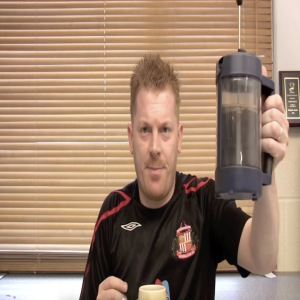
Saturday Sep 14, 2019
Episode 566: El Salvador Finca La Fany Natural Bourbon
Saturday Sep 14, 2019
Saturday Sep 14, 2019
Rafael and Carmen De Silva were the first producers I ever met in El Salvador, and Finca La Fany was the first farm I ever visited in El Salvador. This is a relationship that goes all the way back to 2003, and I consider this to be a real foundation stone coffee for Hasbean.
Finca La Fany has been producing coffee in El Salvador since 1870, and it's belonged to the same family from generation to generation. Situated on the Santa Ana volcano, the farm provides work for 24 families in the community. It's in a biological corridor that stretches for 27 hectares from Mexico to Panama. It grows mostly Bourbon, but also has a small amount of Pacamara.
Carmen and Rafael continually invest in the milling of their own coffee and improving the facilities they have, which has really driven this shade-grown coffee to just get better and better year after year. We think you can really taste the continuous development in the cup; this is one of our all-time favourites, and it's one of the coffees that we'd be absolutely devastated to lose if we were ever unable to get it.
This is one of the cleanest Natural processed coffees you'll find. It's green apple with just a hint of a cider edge to it, and shifts into raisins on the finish. As it fades, there's chocolate in the aftertaste, which pulls you back in for another sip.
- Country: El Salvador
- Department: Ahuachapán
- Municipality: Apaneca
- Farm: La Fany
- Farmer: Carmen and Rafael Da Silva
- Farm size: 20.30 hectares
- Coffee growing area: 20.30 hectares
- Altitude: 1,450 m.a.s.l.
- Varietal: Bourbon
- Processing system: Natural
CUPPING NOTES
Green apple, cider, raisin, chocolate
Clean cup: (1–8): 8
Sweetness: (1–8): 6
Acidity: (1–8): 7
Mouthfeel: (1–8): 6
Flavour: (1–8): 6.5
Aftertaste: (1–8): 6
Balance: (1–8): 6
Overall: (1–8): 6.5
Correction:(+36): +36
Total: (max. 100): 87.5
Roast Information
Medium dark – through first, let it develop and drop with the first pops of second crack as it hits the cooling tray.
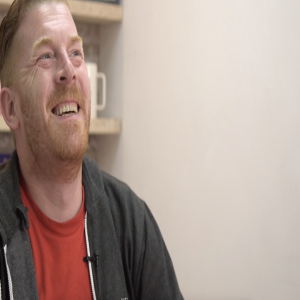
Saturday Sep 07, 2019
Episode 565: Nicaragua Finca La Escondida Washed Red Catuai
Saturday Sep 07, 2019
Saturday Sep 07, 2019
Finca La Escondida is close to Lake Apanas near the city of Jinotega, which is the capital of the department of Jinotega in the north-central region of Nicaragua.
The straight translation from Spanish to English of 'escondida' is ‘hidden’. The farm is called 'Escondida' because it's 'hidden' from the road by forest and trees, which makes it appear to blend right into the side of the mountain.
In the grand scheme of coffee farm things, La Escondida is still a rather young farm. The first trees were planted there in 2006; just thirteen years ago. La Escondida was planned around identifying the plots with individually different micro-environments resulting from factors such as soil quality, sun exposure and temperature range. This is one of the upsides of planting a new farm: getting to plan ahead!
The varietal of this lot is Red Catuai. The owners selected it for the farm because they thought it would do well with the soil quality, sun exposure, temperature range and weather conditions, given the farm's quite exposed on the side of the mountain.
Catuai is related to Yellow Caturra and Mundo Novo, and it's a hybrid that grows best above 800 metres. It is most prevalent in Brazil and Central/South America. This is a dwarf variety of plant; it doesn't grow very high, and this is its most obvious distinguishing trait. Selected by the Instituto Agronomico in the 1950s, it now accounts for 50% of the coffee acreage in Brazil and is widely used in Central America. It also benefits from the fruit not falling off the branch easily. This helps when there are strong winds or rain, or where windbreaker coverage is at a minimum – like it is at this farm.
This may not be Terry's, but it's definitely chocolate orange. There's a sprinkle of brown sugar too before a light zest of lime on the aftertaste.
- Country: Nicaragua
- Department: Jinotega
- Farm: La Escondida
- Farm manager: Boanerje Martinez Montenegro
- Coffee growing area: 92 manzanas
- Altitude: 975–1,230 m.a.s.l.
- Varietal: Red Catuai
- Processing method: Washed
CUPPING NOTES
Chocolate orange, brown sugar, lime zest
Clean cup: (1–8): 6
Sweetness: (1–8): 7
Acidity: (1–8): 6
Mouthfeel: (1–8): 6.5
Flavour: (1–8): 6.5
Aftertaste: (1–8): 6
Balance: (1–8): 6.5
Overall: (1–8): 6
Correction: (+36): +36
Total: (max. 100): 86.5
Roast Information
Medium dark – through first crack and extend the development slightly before dropping just as you reach second crack.
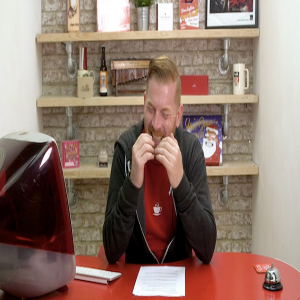
Saturday Aug 31, 2019
Episode 564: El Salvador Finca La Fany Washed Bourbon
Saturday Aug 31, 2019
Saturday Aug 31, 2019
Rafael and Carmen De Silva were the first producers I ever met in El Salvador, and Finca La Fany was the first farm I ever visited in El Salvador. This is a relationship that goes all the way back to 2003, and I consider this to be a real foundation stone coffee for Hasbean.
Finca La Fany has been producing coffee in El Salvador since 1870, and it's belonged to the same family from generation to generation. Situated on the Santa Ana volcano, the farm provides work for 24 families in the community. It's in a biological corridor that stretches for 27 hectares from Mexico to Panama. It grows mostly Bourbon, but also has a small amount of Pacamara.
Carmen and Rafael continually invest in the milling of their own coffee and improving the facilities they have, which has really driven this shade-grown coffee to just get better and better year after year. We think you can really taste the continuous development in the cup; this is one of our all-time favourites, and it's one of the coffees that we'd be absolutely devastated to lose if we were ever unable to get it.
This is brown sugar, milk chocolate and hazelnut. It's full and round with a delicate white grape on the finish. A chugging coffee through and through.
- Country: El Salvador
- Department: Ahuachapán
- Municipality: Apaneca
- Farm: La Fany
- Farmer: Carmen and Rafael Da Silva
- Farm size: 20.30 hectares
- Coffee growing area: 20.30 hectares
- Altitude: 1,450 m.a.s.l.
- Varietal: Bourbon
- Processing system: Washed
CUPPING NOTES
Brown sugar, milk chocolate, hazelnut, white grape
Clean cup: (1–8): 6
Sweetness: (1–8): 6.5
Acidity: (1–8): 6
Mouthfeel: (1–8): 6.5
Flavour: (1–8): 6.5
Aftertaste: (1–8): 6
Balance: (1–8): 7
Overall: (1–8): 6.5
Correction:(+36): +36
Total: (max. 100): 87
Roast Information
Medium dark – just into the first pops of second crack and drop.
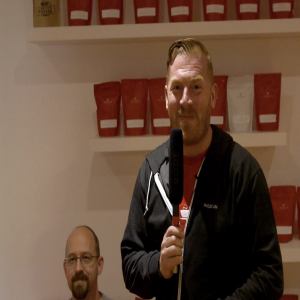
Tuesday Aug 27, 2019
Episode 563: Honduras Finca Cerro Azul Natural Longberry
Tuesday Aug 27, 2019
Tuesday Aug 27, 2019
Cerro Azul is one of the Mierisch family’s newer coffee projects in Honduras. The name 'Mierisch' might sound familiar; they have brought us Limoncillo, Escondida, San Jose and Mama Mina, to name just a few of their amazing farms.
The Mierisch family have been growing coffee for four generations, going on five, in Nicaragua. They have achieved great results with their special way of farming, and more importantly by reaching out to specialty buyers and being at the forefront of coffee development.
This farm started life as an experiment for the Mierisch family. To farm here, they went across the border of their mother country and drove six hours from their home to neighbouring Honduras.
I've spoken with Erwin a lot about why the family made this decision, and it came down to his experiences as one of the Head Judges for the Cup of Excellence competitions in Honduras. He had seen amazing potential, but he'd also seen a lack of care and attention to detail during the processing stage. This detail is vital to truly special coffee, and Erwin and his family are some of the best-qualified processing technicians I have ever met. This opportunity was a match made in heaven.
In 2011 they started the project of revitalising Finca Cerro Azul in the region of the national park, Azul Meambar. It's in Siguatepeque, Comayagua, Honduras, and is across from Finca El Cielito, Santa Barbara. The farm lies on the other side of Lake Yojoa, and is blessed with micro-climates and conditions which are familiar to the family because those conditions are similar to the ones they experience on their lands in Nicaragua.
But the soil is something else, as is the plant stock they have inherited. We were some of the first to taste the fruits of their hard work and long drives to their new farm.
All aboard the funky bus! For me this is sweet, sticky macerated strawberries all over, with a little bit of peach on the side. There's a shoulder of pecan on the aftertaste too. Anyone else wanting dessert now?
- Country: Honduras
- Department: Comayagua
- Municipality: Siguatepeque
- Community: Rio Bonito
- Farm: Finca Cerro Azul
- Farm managers: Francisco Escobar and Lidia Zeledon
- Farm owners: The Mierisch family
- Area: 135 hectares
- Elevation: 1,450–1,900 m.a.s.l.
- Varietal: Longberry
- Processing method: Natural
CUPPING NOTES
Macerated strawberries, peach, pecan
Clean cup: (1–8): 6
Sweetness: (1–8): 7
Acidity: (1–8): 6.5
Mouthfeel: (1–8): 6.5
Flavour: (1–8): 7
Aftertaste: (1–8): 6.5
Balance: (1–8): 6
Overall: (1–8): 7
Correction:(+36): +36
Total (max. 100): 88.5
Roast Information
Medium – don't be afraid to throw heat at it. Keep pushing through the gap, and then drop right at the end of the gap.

Saturday Aug 17, 2019
Episode 562: Guatemala El Libano Washed
Saturday Aug 17, 2019
Saturday Aug 17, 2019
This farm was originally called 'La Pampa'. It was purchased by Mr Prudencio Perez Rosales in 1915. When he unfortunately passed away, his daughters inherited the farm and divided it equally into three properties called La Pampa, San Juan, and El Libano. Herbert purchased El Libano in 1992.
In the early days of El Libano (or La Pampa, I guess I should say) coffee was commercialised in cherry form with other farms and/or buyers who took it to local wet mills for the post-harvest process. When coffee production at the farm increased between 1958 and 1960, a wet mill was built on a lower part of the farm and drying fields were built in the higher parts.
At that time, coffee was taken by workers on mules from the pulping area to the drying fields. This was down a narrow road, which (as I'm sure you can imagine) made work rather difficult. This was extended in 1970, and thanks to increasing coffee sales they were able to buy a vehicle to let the mules get some rest.
There have been many changes to the farm since then. They improved the quality of what they could produce via modernisation of the wet mill and the pulping area, and by improving the drying process. In the drying area they have increased the drying patios and added a guardiola dryer, which has the capacity of processing 40 quintales (4 kilos) of coffee.
Besides producing delicious coffee, El Libano also plays a really important role for the local people. The farm's workers have been provided with equipped houses to live in on the farm with their families, and they've also built not just one but two modern swimming pools for workers and their families!
It's located in the traditional Guatemalan coffee region of Chimaltenango. It's 21 hectares in size, with 17.5 of them set aside for coffee production. Its owner is Herbert Estuardo Perez Liquidano, who is a third generation coffee producer on this farm.
The farm sits at 1,350 metres above sea level, and it grows a mixture of Typica, Bourbon, Caturra, Pache, Pache Colis and Geisha coffee. This lot is a mixture of Caturra, Typica, and Bourbon.
If you've got a sweet tooth, this one's for you - it's full on Orange Fruit Pastille. There's a hint of milk chocolate too, with an aftertaste which reminds me of cocoa nibs.
- Country: Guatemala
- Department: Chimaltenango
- Municipality: Acatenango
- Nearest village: La Pampa
- Farm name: El Libano
- Farmer: Herbert Estuardo Pérez Liquidano
- Altitude: 1,350 m.a.s.l.
- Processing method: Washed
- Drying: Sun dried
- Farm size: 21 hectares
- Coffee growing area: 17.5 hectares
- Varietal: Caturra, Typica, and Bourbon
CUPPING NOTES
Orange Fruit Pastille, milk chocolate, cocoa nibs.
Clean Cup: (1-8): 6
Sweetness: (1-8): 7
Acidity: (1-8): 6.5
Mouthfeel: (1-8): 6
Flavour: (1-8): 6.5
Aftertaste: (1-8): 6.5
Balance: (1-8): 6.5
Overall: (1-8): 6
Correction:(+36): +36
Total (max 100): 87
Roasting Information
Medium - Medium Dark - Through first and let it develop a little, but this one can shine anywhere from the end of the gap into the first pops of second, depending on your preference.

Saturday Aug 10, 2019
Episode 561: Costa Rica Finca Licho Yellow Honey
Saturday Aug 10, 2019
Saturday Aug 10, 2019
Licho's is a coffee that I feel shows our development as a roaster over the years. We first bought this coffee in the Cup of Excellence program (a great way to meet a grower). Back then we bought it from an import broker; they helped us bring in this coffee because we are a small coffee buyer. Now we buy directly from the farm!
Four years ago, I went out to the farm and did the deal then and there with the brothers. I love the fact that I simply walked onto the farm after cupping a particular lot in the exporter's office, asked how much they wanted, and there was a short conference. They came back and told me how much they wanted, and then we shook hands. Then we got back into the 4x4 and drove away. That year we agreed a European-exclusive deal with them for this coffee, and this year we continue the close work we have been doing with them.
Grown by the Aguilera brothers in the province of Naranjo, in the volcanic Northern Cordiles corridor of the Western Valley, this coffee is cultivated at an altitude of 1,500 metres above sea level. Most of their coffee is of the Villa Sarchi variety, which is native to the area and excellent in the cup. Villa Sarchi is a Bourbon mutation (similar to Caturra and Pacas) originally found in Naranjo. It's a dwarf variety with short internodes and (usually) higher-yielding production.
The Aguileras are twelve brothers and sisters, all of whom are involved in coffee as inherited from their parents. The brothers work the mill and farms themselves with basically no hired labour except for pickers during the harvest. With the help of the third generation, they work the mill and drying patios, prune the coffee fields, fertilise, and so on; and they do it all year round. The Aguilera brothers understand quality at the farm and mill level, and this is why we are excited about working with them.
This coffee is honey processed, which is like the pulped natural method. The fruit is removed from the seed of the coffee bush and left to dry. The main difference is that there is no water involved when the cherry is removed, so mucilage sticks to the bean. This can be dangerous, but it's necessary in these parts of Costa Rica where water is limited: water is a precious commodity in this area of Naranjo, so this method suits the location very well.
The coffee ends up clustering whilst drying because there is so much mucilage. So the coffee either needs to be turned regularly to stop this happening, or it has to be broken up. Over-fermentation can happen at this stage and you can end up with a not-so-good cup, but the Aguilera brothers are well-versed in this method and are some of the most skilled in Costa Rica.
Want to know a little more about honey processing? Here's a video you might enjoy!
In the cup this has loads of fruity sweetness. It's apricot and raspberry mashed up, but with a lovely syrupy texture that makes this as much a crowd-pleaser this year as it is every year.
- Country: Costa Rica
- Region: Western Valley
- Province: Alajuela
- Nearest city: Naranjo de Alajuela
- Farm: Finca Licho
- Producers: Aguilera family
- Farm size: 28.00 hectares
- Coffee growing area: 9.10 hectares
- Altitude: 1,500 m.a.s.l.
- Varietal: 70% Villa Sarchí and 30% Caturra
- Processing system: Yellow Honey
CUPPING NOTES
Apricot, raspberry, syrupy
Clean cup: (1–8): 6
Sweetness: (1–8): 7
Acidity: (1–8): 6.5
Mouthfeel: (1–8): 6.5
Flavour: (1–8): 6.5
Aftertaste: (1–8): 6
Balance: (1–8): 6.5
Overall: (1–8): 7
Correction:(+36): +36
Total: (max. 100): 88
Roast Information
Medium – take it through first crack and slow it down a bit, dropping before you reach second.
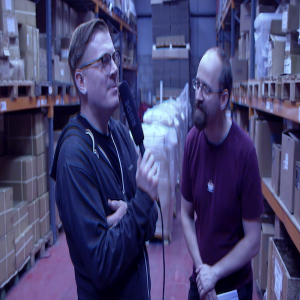
Saturday Aug 03, 2019
Episode 560: El Salvador Finca Argentina Washed Bourbon
Saturday Aug 03, 2019
Saturday Aug 03, 2019
I've been working with Alejandro Martinez since way, way back in 2008, and in that time our relationship has gone from strictly professional to Alé being one of my closest friends.
He became involved in coffee in 2008 because he had just relocated to El Salvador from New York, where he'd been working as a city banker. With his first son on the way and the hustle and bustle of New York being no place to bring up a family, the draw of home and El Salvador was just far too strong to ignore.
While looking for work in El Salvador, Ale decided to help his father with some of his business interests and investments. His father had inherited several coffee farms from his grandfather and was unsure what to do with them. One of the investments pricked Ale’s interest, and this was a farm called Finca Argentina. The reason it really got Ale's attention was that he saw the farm once yielded loads of coffee but was producing a fraction of its old productivity. His father gave him permission to see what could be done to make the farm successful again.
Ale found out the farm had been classified for a Q auction back in 2005. Thinking there may be a specialty buyer out there, he and his cousin (who lived in London) went about sending samples to coffee roasters anywhere they could. One of those samples arrived at Has Bean Towers, just like a lot of other samples do; unusually, I liked the coffee, and the rest – as they say – is history.
Since then Finca Argentina has gone from strength to strength, but not without bumps in the road. In 2013 it suffered the worst harvest on record, with only 70 bags harvested due to a massive issue with leaf rust. But with investment and hard work, the farmers have also bought a neighbouring farm, and the future is amazingly bright for Ale, his father, his family and Finca Argentina.
The farm is based in the Apaneca-Ilamtepec mountain range, and is near the town of Turin in the Ahuachapán department. Sixteen people work on the farm during the non-picking season, maintaining and tending to the plants. This number of workers goes up to 50 people during the picking period. The altitude of the farm is 1,300 metres above sea level (m.a.s.l.).
This coffee is 100% Bourbon, as 70% of plant stock in El Salvador is. This heirloom varietal is one of the reasons why coffee from this country is right up amongst some of the best in the world. They have the perfect climate and conditions for this low yielding, high maintenance strain.
This is such an easy-drinking coffee – think hot chocolate with hints of green apple and a fruity sweetness to it. That's wrapped up with a little hit of cocoa powder on the finish.
- Country: El Salvador
- District: Ahuachapán
- Municipality: Ahuachapán
- Nearest city: Turin
- Farm: Finca Argentina
- Owner: Alejandro Martinez
- Altitude: 1,300 m.a.s.l.
- Varietal: Bourbon
- Processing method: Washed
- Drying method: Patios
CUPPING NOTES
Hot chocolate, green apple, cocoa powder
Clean cup: (1–8): 6
Sweetness: (1–8): 6.5
Acidity: (1–8): 6
Mouthfeel: (1–8): 6
Flavour: (1–8): 6.5
Aftertaste: (1–8): 6
Balance: (1–8): 7
Overall: (1–8): 7
Correction:(+36): +36
Total (max. 100): 87
Roast Information
Medium dark – through first crack, and then steadily up to the very first pops of second as it finishes.

Saturday Jul 27, 2019
Episode 559: Kenya Karagoto Washed Peaberry
Saturday Jul 27, 2019
Saturday Jul 27, 2019
Quite close to Kieni near the town of Karatina, Nyeri is the Karagoto wet mill. It's owned by the Tekangu Coffee Farmers Cooperative Society, which got its name from combining the names of their three mills: Tegu, Karogoto and Ngunguru. Much like Kieni, it has seen success in recent years and has secured some really great prices for the farmers that deliver their coffee cherries there.
The mill is split in half by a road, with the sorting shed and fermentation tanks on the lower side and the drying beds on the upper slope of the hill. Both sides are pretty steep, with a great view of the valley and weaver birds making their homes in the trees around the mill.
Ephraim Maina Muthee, who showed us around when we visited in 2016, manages the mill and Steve planted a coffee plant with him on the slope just below the sorting shed.
Normally the seed of the coffee fruit grows into the green bean that we all know and love from two fertilised seeds inside each fruit, but sometimes things are a little different and a Peaberry is born. When only one of the two seeds is fertilised, it produces a smaller bean that looks like a shrunken version of what we'd normally know as a coffee bean, and that's because only one seed has grown instead of two.
Some say Peaberry coffees are sweeter and more delicious than their regular cousins; some people even come to us specifically looking for these coffees because they crave them so much! I'll let you be the judge.
Ever had caramelised orange? This coffee is full of it. There's a little blackcurrant edge and it's sightly sherbet-like too.
- Country: Kenya
- County: Nyeri
- Nearest town: Karatina
- Mill: Karagoto
- Owners: Tekangu Coffee Farmers Cooperative Society
- Contributing farmers: 1,700+
- Altitude: 1,700 m.a.s.l.
- Varietal: Peaberry
- Processing method: Washed
- Average rainfall: 1,500 mm
- Temperature range: 12–27°C
- Soil type: Well-drained red volcanic soil rich in phosphorus
CUPPING NOTES
Caramelised orange, blackcurrant, sherbet
Clean cup: (1–8): 6
Sweetness: (1–8): 7
Acidity: (1–8): 6.5
Mouthfeel: (1–8): 7
Flavour: (1–8): 6.5
Aftertaste: (1–8): 6
Balance: (1–8): 6
Overall: (1–8): 7
Correction: (+36): +36
Total: (max. 100): 88
Roast Information
Medium - through first and keep it going fairly quickly through the gap, dropping the roast just before second crack gets going.
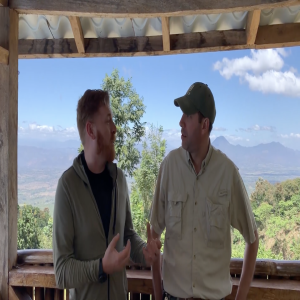
Saturday Jul 20, 2019
Episode 558: El Salvador Finca Argentina Piletas Natural Bourbon
Saturday Jul 20, 2019
Saturday Jul 20, 2019
I've been working with Alejandro since 2008 and in that time our relationship has gone from strictly professional to Ale being one of my closest friends. He became involved in coffee in 2008 as he had just relocated to El Salvador from New York where he'd been working as a city banker. With his first son on the way and the hustle and bustle of New York no place to bring up a family the draw of home and El Salvador was just far too strong to ignore.
While looking for work in El Salvador, Ale decided to help his father with some of his business interests and investments. His father had inherited several coffee farms from his grandfather and was unsure what to do with them, one of the investments pricked Ale’s intent and this was a farm called Finca Argentina. The reason it really got Ale's attention was that he saw the farm once yielded loads of coffee but was producing a fraction of its old productivity. His father gave him permission to see what could be done to make the farm successful again
Ale found out the farm had been classified for a Q auction back in 2005. Thinking there may be a specialty buyer out there he and his cousin (who lived in London) went about sending samples to coffee roasters anywhere they could. 1 of those samples arrived at Hasbean Towers just like a lot of other samples do, but unusually I liked the coffee and the rest, as they say, is history.
Since then Finca Argentina has gone from strength to strength but not without bumps in the road. In 2013 they suffered the worst harvest on record, with only 70 bags harvested due to a massive issue with leaf rust. But with investment and hard work they have also bought a neighbouring farm and the future is amazingly bright for Ale, his father, his family and Finca Argentina.
The farm is based in the Apaneca-Ilamtepec mountain range, and is near the town of Turin in the Ahuachapán department. Sixteen people work on the farm during the non-picking season, maintaining and tending to the plants. This number of workers goes up to 50 people during the picking period. The altitude of the farm is 1,300 m.a.s.l.
The coffee is 100% Bourbon, as 70% of plant stock in El Salvador is. This heirloom varietal is one of the reasons why coffee from this country is right up amongst some of the best in the world. They have the perfect climate and conditions for this low yielding, high maintenance strain.
Before he'd met me Ale hadn't done any natural processing, maybe he misses the days before he had someone like me pestering him with silly ideas! But I like to think this coffee proves we did a good thing convincing him to give it a go.
In the cup this is a sweet and juicy natural - lots of raisins and candied fruit peel is backed up by a creamy sweetness that makes me think of a crème brûlée - right down to the little hints of caramel.
- Country: El Salvador
- District: Ahuachapán
- Municipality: Ahuachapán
- Nearest city: Turin
- Farm: Finca Argentina
- Owner: Alejandro Martinez
- Altitude: 1,300 m.a.s.l.
- Varietal: Bourbon
- Processing method: Natural
- Drying method: Raised African beds
CUPPING NOTES
Raisin, candied peel, crème brûlée, caramel
Clean Cup: (1-8):
Sweetness: (1-8): 6.5
Acidity: (1-8): 6
Mouthfeel: (1-8): 7
Flavour: (1-8): 7
Aftertaste: (1-8): 6
Balance: (1-8): 6.5
Overall: (1-8): 6
Correction:(+36): +36
Total (max 100): 87
Roast Information
Medium - Nice and quick through first crack, drop just at the start of second crack.

Saturday Jul 13, 2019
Episode 557: Costa Rica ARBAR Finca Manantial Red Honey
Saturday Jul 13, 2019
Saturday Jul 13, 2019
When we found this farm for the very first time all the way back in 2013 we knew very little about it, so little in fact that the coffee didn't even have an official name! Back then all we knew was that the coffee was grown by a gentleman called Carlos Arrieta and it was really, really delicious! However, since then I've been lucky enough to visit Carlos on my trips to Costa Rica and, over the past few years, have found out lots more.
The farm is located in the Western Valley region near to the town of Lourdes de Naranjo. It's located at 1,600 meters above sea level and contains mostly Caturra, Catuai + a tiny bit of Villa Sarchi, there are also plans to plant some small micro lots too in the future. El Manantial is actually one of Carlos's four farms...
- La Casa - mostly planted with Geisha and Kenya!
- La Isla - not in production yet
- El Oasis - slightly smaller than El Manantial and produces around 6,000kg of fresh cherries each year
- El Manantial - around 3 hectares in size and produces around 8,500kg of fresh cherries each year (amounts to just over 1,000kg of green coffee when processed)
Carlos runs the farm with his wife and children, Maria Isabel, Yessica, Karen, Esteban and Jose Ignacio. He has owned this farm for almost twenty years but only started processing the coffee himself in 2014 (while still paying someone else to pulp it for him). He hadn't been able to present his coffee to a single buyer previously, so he would send it to the exporter we use in Costa Rica and, thankfully, that's how we found him!
The mill name "ARBAR" comes from the combined family names - Carlos ARietta and Maria BARboza - ARBAR. Their children are Yessica, Karen, Esteban & Jose Ignacio.
Carlos is very active in the local community and they have close relationships with their neighbours - which includes CoE winning mills like Herbazu, Vista Al Valle and Sumava. They operate mostly Organic processes, but aren’t Organic certified. They believe in the value of biodiversity on the farms and plants like fruit trees are positioned amid the coffee plants for shade and to help the soil - as well as providing food for the family. They have 1 full-time employee who lives on the farm.
Their latest project is La Isla. This small plot of land belongs to Maria’s niece. Carlos and Maria have agreed an arrangement with her where they will plant and farm the plot and share the profits with her, but this is still very early in it’s production life.
Activity from the Poás volcano at the start of 2019 has impacted the Western Valley region, really quite badly in some areas. Although ARBAR appears to have been lucky with this, we won’t know the final impact until next years crop.
In the cup this is super sweet but clean - think orange squash with some extra white sugar. There's a shoulder of peach too, before it changes into mango on the finish.
- Country: Costa Rica
- Region: Western Valley
- Town: Lourdes de Naranjo
- Farm: Finca El Manantial
- Farmer: Carlos Arrieta
- Micro mill: ARBAR
- Altitude: 1,600 m.a.s.l.
- Varietals: Caturra & Catuai
- Processing system: Red Honey
CUPPING NOTES
Orange squash, white sugar, peach
Clean Cup: (1-8): 6.5
Sweetness: (1-8): 6.5
Acidity: (1-8): 6.5
Mouthfeel: (1-8): 6
Flavour: (1-8): 7
Aftertaste: (1-8): 6
Balance: (1-8): 6.5
Overall: (1-8): 6.5
Correction:(+36): +36
Total (max 100): 87.5
Roast Information
Medium - all the way through first, drop it right at the end of the gap.



